#general rule of thumb for dialogue that i have for them is that it should be funny
Explore tagged Tumblr posts
Text
The reason I, like, never post my DaveKat art aside from that one post is bc I am TERRIFIED of mischaracterizing them. I hope this helps.
#saying i hope this helps as if anyone asked#i draw them a lot actually cause theyre fun to doodle#besides like vrisrezi and janeroxy theyre my most doodled ship#but fanon davekat is so weird and “ehhhh” its like. i feel like i need to hold myself to a super high standard to differentiate myself#and if my art has DIALOGUE???? oh god#general rule of thumb for dialogue that i have for them is that it should be funny#like actually funny#most of their interactions in canon are really funny#also i need to find this balance with how in touch they are with their emotions like dave is NOT that outwardly self-aware initially#and it depends on the time setting of the art too#but also like. hes not dumb. on some level he knows whats going on and what happened to him and who he is he just ignores it#and karkat#karkats actually easy to characterize for me the one thing i need to remember is that he says and does super embarrassing shit sometimes#and one must learn to live with this#oh and obviously im not gonna write them in a weird like. straight way? is the best i can describe it?#if you were around in old homestuck fandom or have seen old fics you know exaaaactly what i mean#why do they make dave actually CREEPY to karkat he wouldnt do that. ever.#i dont even know where that comes from tbh#like homophobia obviously but howwww#daves never really acted like that with karkat#and hes never acted like that with any of the characters hes popularly shipped with either (john. jade. terezi) like thats not him#highschool aus are the worst perpetrators of this btw sorry#why are you guys making him a jock⁉️⁉️⁉️
1 note
·
View note
Text

Reign's Writing Tips
Pt 1 - General advice
I just want to say first, as a disclaimer, that I don't regard myself as the authority on 'good' writing, I've just gotten quite a few people asking for help and people expressing curiosity for my creative process.
Please don't consider this as a checklist and feel like you're doing things wrong, this is just a way for you to get a sense of where to begin and conceptualise where you'd like to be. We're all on different paths and those paths are not more or less valid than others.
This guide will include examples from my own works and hypothetical ones, using only written fics (smaus have their own guide, please find it in my navigation). This also doesn't tackle how to write fanfiction specifically, just general fictional writing.
These are formatted based on the questions I received in my messages and inbox.
Content:
༯ How to show and not tell ༯ How to write dialogue ༯ How to increase word count and why you might want to ༯ Other advice ༯ Paragraph structuring ༯ Punctuations ༯ How to fix up typos ༯ How to get better generally ༯ Final disclaimers
How to show and not tell!
༯ Beginner writers, and indeed, established ones too, often forget the very important rule of showing and not telling. This rule, of course, refers to the idea of building up descriptions or hinting to a certain thought so that the readers may reach that conclusions themselves.
༯ It's important you trust your readers to be able to follow along on their own. Sometimes if you tell them what to think it can cause a disconnect between your writing and them.
༯ This is also a good way of varying your sentences and not coming off as repetitive.
Emotions
༯ Let's go through some examples via the art of expressing emotions.
Example: Pathetic piner!Gojo
Pathetic piner!Gojo asks, voice rough and distorted, “Did you sleep with him? Do you love him?”
༯ Here, we can see that there is no definitive emotion asserted. I didn't write 'Gojo asks, upset' or 'Angry, Gojo asks'
༯ Instead, I am describing his voice. Using the adjectives 'rough' and distorted' allows the readers to figure out for themselves how he's feeling without being too simplistic.
༯ Often, expressing emotion in this way is better than simply saying he's sad or confused because those words can't capture the complexity of his feelings.
༯ Now, let it be known that it can be just as good to be direct about a character's feelings. It is simply all about intention. What are you trying to convey here?
༯ Another important thing to note is that if your work is written in a certain narrative voice, i.e. first person, you should limit information to what that character could only know realistically.
༯ In the context of the above example, it is 'y/n' who is perceiving Gojo, thus it would only make sense that they'd have a limited understanding of how exactly Gojo is feeling. So, instead of them catching on immediately that he's upset, they instead can only note down these things that are out of the ordinary.
༯ Use body language to describe their emotional state.
More examples:
The corner of his mouth curved up = smiling, finding humour in something
His brows furrowed = confusion, concentration, tension
Her lips pursed = dissatisfaction, barely restrained anger
Hand flexed, jaw ticked, teeth bared = anger, thoughts of violence
Sniffled, bottom lip trembled = about to cry, sad, trying not to be
How to write dialogue!
༯ Vary your sentence structures
Example: Homecoming
“Sorry, Si.” He swings his arm around the back of your thighs, encouraging you to straddle him. “You just look so good.” He hums, letting you get settled in his lap whilst he rubs his thumb over the skin of your hip almost as if he can’t help himself. “Can look as much as y’ want, lovie. ‘m all y’rs.”
༯ You can have speech at the beginning and at the end of a paragraph. Not in the middle though — it's messy and confusing if written in the middle because the dialogue gets lost in the paragraph (but note that you can do as you please. It's just one of those 'rules' that aren't really 'rules')
༯ You also don't need to use say/said and other variations of that. It's enough to simply have the speech enclosed.
༯ A good rule of thumb when using say/said/other variations is if there's something significant about the way in which it was said.
Example: A Cursed Forest
His amber eyes cut through yours, and with disdain, he orders, “Finish your food, and do not question me anymore.”
༯ Here, I introduce the speech with 'orders' to show that Sukuna (the character referred to as 'he') is not speaking kindly or like they are equals. It reasserts the power imbalance between the two characters. I also say that it is being said 'with disdain' to emphasise the tension between them, to give some kind of understanding as to his feelings towards the other character.
༯ It is also a way for me, as the writer, to add depth to the other character: she is able to recognise disdain because she has faced it her entire life.
༯ Another thing to be aware of when making dialogue is restrict one paragraph to one character's speech. Please don't do multiple people speaking in one section. It's very messy, confusing and not 'proper.' Again, if that is how you like things, perfectly fine! It's your style, but if you care about doing things 'right' then yeah, one person's speech per paragraph please.
How to increase the word count!
༯ I didn't actually know to phrase this so I'll just yap about what I mean
༯ There are going to be instances where you'd like to space out dialogue so it's not coming off like a script.
Example:
He said, "You need to do your homework." "I don't want to." "You must, young lady." "Says who?" "Go to your room!"
༯ Try to avoid, as much as possible, having lots of clusters of these one sentence conversations.
༯ Once in a while is fine and can be effective in expressing something like the speed at which these words are being exchanged, exploring their tense dynamic.
༯ But if snappiness isn't what you're going for and you find that you're having lots of these clusters then fill the spaces between dialogue with details and descriptions.
Example:
Tired yet insistent, he said, "You need to do your homework." "I don't want to." "You must, young lady." Clare's father was always nagging at her. She thought it unfair, considering she had just turned sixteen and ought to be treated like the young lady that she was. Capable and intelligent, she could decide for herself how she was to spend her evenings. "Says who?" "Go to your room!" He roared. Her legs took her upstairs faster than she could process the fright he had given her. Never in all of her life had her father ever raised his voice like that; she knew not what to do. He was a mild-mannered man, not timid or passive, but rather, calm and rational. To see him in a fit of rage so volatile, shook Clare's constitution to no end that night.
༯ Use body language descriptors, describe the weather, the room they're in etc.
༯ What are the characters seeing and experiencing?
༯ Don't write it as if you're a fly on the wall if you've taken on a specific pov. Embody the character. See what they see, hear what they hear, feel for them. They aren't 2D characters, bring them to life with anecdotes, with thought processes, anxieties and fears.
༯ Another instance where you'd like to fill up the word count might be if you're trying to give the sense of time passing.
Example: In Sheep's Clothing
“Well, you should still afford me the decency of leaving my home when asked.” “Your home? Didn’t know the old lady gave it away.” You gulp, clutching the thick blanket even tighter. “You knew my grandmother?” He grunts. Well aware you really ought to kick him out, you’re ashamed at the realisation that you can’t bring yourself to. It’s awfully terrible outside and there’s no doubt the elements would claim him if he he’s left out with no shelter. And if he wanted to kill you, he could have done that before. And at any rate, it’s too late to do anything about it now. He knows you’re alone and there’s nowhere you can run to before the snow freezes your limbs. “Is it good?” You ponder. Settling back down onto the sofa, you just watch him eat. He’s grabbed a second helping.
༯ This example is actually not the final product. It was my first draft where wolf hybrid!toji is eating and conversing with a woman/y/n he has found himself stuck with during a snow storm.
༯ I thought it awkward in showing that he's eating. Sure, it could seem like he's eating really fast but it felt unrealistically fast, even given the context so I knew I wanted to fill in the space.
༯ Instead of talking on and on about how he's eating, I chose to dedicate this section with y/n's thoughts.
༯ One, descriptions of someone eating gets boring very fast
༯ Two, it would be extremely unrealistic for reader to just accept that this man will be staying with her with just one paragraph of thinking.
༯ Three, the concept of being hybrid needed to consistently matter in the story. So I chose to fill the details with exposition on that aspect of the story
Here is the final product:
“Well, you should still afford me the decency of leaving my home when asked.” “Your home? Didn’t know the old lady gave it away.” You gulp, clutching the thick blanket even tighter. “You knew my grandmother?” He grunts. Well aware you really ought to kick him out, you’re ashamed at the realisation that you can’t bring yourself to. It’s awfully terrible outside and there’s no doubt the elements would claim him if he he’s left out with no shelter. Though, that really shouldn’t be your responsibility and there is still, of course, the glaring concern of his ability to kill you. One sweep of his figure and you know this towering man, tall and muscular, could snap your neck with one hand. Or worse. Not to mention, he’s a hybrid. You can tell by the twitching of his ears and his nose, like he’s hearing and smelling things inscrutable by the human senses. You wonder what he is. He has no triangular ears or fluffy tail like a dog, he doesn’t have eyes like a cat, no scales that you can see, but his teeth, when he scrapes them along the spoon, you know they’re much sharper than you’d like to ever find out. If he wanted to kill you, he could have done that before. And at any rate, it’s too late to do anything about it now. He knows you’re alone and there’s nowhere you can run to before the snow freezes your limbs. Settling back down onto the sofa, you just watch him eat. He’s grabbed a second helping, enjoying the meat more than the potatoes and carrots in there but that’s expected of a man. It does mean, though, that he’s not a herbivore hybrid. You wonder if he likes the taste of a woman’s flesh. “Is it good?” You ponder.
༯ Hopefully, in this example you can get a sense of how 'rambling' can be useful in delivering specific effects.
༯ Note: too much dialogue can be bad. We need description and details to fill up the mind. Don't be afraid to give the details you'd like to give if you think it's important.
༯ Alternatively, not enough dialogue can also be bad. Too many thick paragraphs can disengage a reader and many people look forward to dialogue because it's much easier to process than chunks of information.
Other advice!
Paragraph structure
༯ Vary your paragraphs with one sentences and longer sections. Having too many thick paragraphs can be quite boring. Apart from aesthetics, these different length sections can provide a function.
Example: Lying To Himself
The guys at work know better than to open their fat mouths around him when he turns up with an extra wrinkle and a ticking in his jaw. Toji is somehow even more sadistic and violent and eager for blood. Even finally accepts their invitation to go out for drinks and drowns himself in the extra strong shit. Assuming he just woke up on the wrong side of the bed, they don’t question his sour mood. But what they don’t know is that you texted, just a day before you’re set to come back, to let him know you’re staying another week. Fucking texted. Didn’t even get to hear it from your own voice.
༯ Longer paragraphs can cluster all these actions, detailing the things Toji has gotten up to and summarising how an unspecified time has passed. By condensing his days into one decently sized paragraph, a reader can gain the sense that his days have been monotonous and repetitive without even needing to read every part of it.
༯ The short, two word line is impactful and has been separated from the paragraph before it to deliver the punchiness. Here, Toji is angry. You can get this a) from the swear word but also from b) the fact that it's a two word sentence.
༯ It mimics the way one would grit out as they repeat information they dislike. Readers can very easily picture his face and his mental/emotional state just from two words.
༯ Another thing is to vary your paragraph openings.
A bad example:
He walked up to me, upset and clearly with choice words to deliver. No one else in the diner spared him a second glance. But I have no choice. I'm shaking with fear. He looks ready to punch me. The way his hand is balled into a fist is damn near pushing me to piss my pants. Surely, he wouldn't hit me here, right? There are witnesses. It would be stupid.
A better variation of this:
Walking up to me, upset and clearly with choice words to deliver, no one else in the diner spares him a second glance. But I have no choice. Fear shakes me from within. He looks ready to punch me. Hand balled into a fist, I'm damn near pushed to the edge of pissing my pants. Surely, he wouldn't hit me here, right? Witnesses are around us. Stupid. It would be stupid. Right?
༯ Words like he/she/they/the/it/then are overused sentence openers. They are perfectly fine to use, of course. I am not saying avoid them altogether.
༯ What I am saying, however, is change it up to make it interesting.
༯ Begin a sentence with an action verb like walking rather than simply 'he walked.'
Punctuations
༯ Try to use semi-colons, colons and dashes but read up on how to use them correctly. It's easily Googled. It's not a major issue, it's just a way of varying your writing and making it more interesting.
༯ When using quotation marks, commas and full-stops go before the quotation.
Like so:
"Pick me. Choose me. Love me."
"I love you," she confessed.
Quivering, he asks, "Do you hate me?"
༯ Again, not major issues, but just for cleanliness.
How to fix up these typos and messiness
༯ I write in my Notes app first and then I paste my work in Word just to see the blue and red underlines. It allows me to visualise where there are mistakes so that I don't have to read every word with great focus, I can just skim as I proofread
༯ You can also use things like Grammarly, though I generally wouldn't want to encourage you to use AI to edit your work for you. It's just an option if you need it.
༯ The best trick is to just learn how to follow these rules to do with syntax and language. Watch tutorials online and when reading works online or books, think critically about how things are formatted.
༯ This leads me to my next and final advice in this part
How get better generally
༯ Read more!
༯ But don't just absentmindedly consume media, engage critically.
༯ Ask yourself these questions:
What is it about this piece of work that you like?
What's the style of writing the author has chosen? Is that their general style or have they chosen something specific for this work?
Why is this work more popular than another?
How do their sentences begin?
Is the writing full of prose?
Is it too much prose for my liking?
Oh, there's a particular bit that made me feel scared and uncomfortable, how did they do that? Is it their sentence structure? The adjectives they chose? Is it the build up of tension? If it's the tension, how did they achieve that in the previous paragraphs?
That made me giggle, how did they manage to be so funny?
Is that how I would have written it? If I had done it my way, would the impact still have been the same?
What if I try writing in their style?
Final disclaimers!
༯ You don't have to follow all of this or even any of this. Just having read this and reflected on your writing is a great place to start. If you know who you are as a writer, then you'll be much better placed to express your ideas
༯ Writing is a journey. Most people will look back on their beginning and think damn I was so bad at writing. But that's just a great way of knowing you've come far.
༯ There is no wrong or right way to write, no matter what people say. Even if you write unconventionally and make lots of typos and errors, there might still be many people who enjoy your works.
༯ Don't try to be someone else. It sounds cheesy to say be yourself, but it's true. We need more diversity in writing. My favourite works, the ones who left a mark on me, who shaped me, are all so different from each other.
༯ Don't be afraid to experiment and try something new. Find yourself however it takes.
༯ If you're writing on here or a similar platform, you'll be opening yourself to being perceived. Establish your boundaries from the start. Are you open to feedback? It's completely fine if you are not. Some people aren't here to 'get better,' they're just here to have fun.
༯ And if you are open to feedback, it's absolutely okay to feel upset by what you hear/read. Just remember that a lot of these critiques are founded on preferences and some critics might have just misunderstood your works. There is no supreme authority on right and wrong here. No one knows everything. No one is perfect.

If you have any questions, things you'd like covered in a next part, please share them. Thank you to everyone who contributed to this by asking questions and being candid about their struggles.
I hope this helped and I wish everyone the very best in their writing journey
Happy writing!
122 notes
·
View notes
Note
Hello! i absolutely adore your art and agree with your sonic opinions, you're overall one of the best sonic blogs out there. May i ask how do you plan out and draw your comics? How do you choose the formatting of panels themselves, the composition, the dialogue and so on? From A to Z, please! I apologize if this ask might be inconvenient, but i'm curious because i love your comics and have attempted to draw a sonic comic myself that failed miserably.
Typically the first step I will take is to just rough it out in a sketchbook, because I find it much faster and when working digitally I feel more pressure to make things look nice. This is where I start thinking about paneling and composition. It doesn't look perfect or cohesive at this stage, but at least now I have a rough idea presented with barely legible scribbles that don't make sense to anyone but me.
For paneling, large panels linger more, and small panels indicate quick succession. This is the most important rule I personally follow when making panels. It affects things like comedic/dramatic timing and how the reader will be guided through your comic.
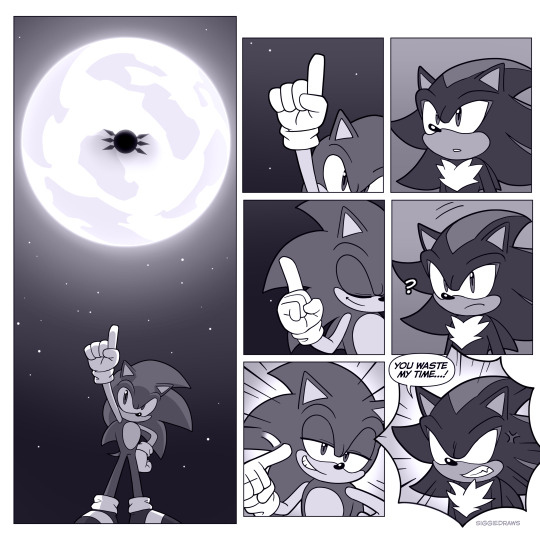
It's important to vary up the composition when it comes to dialogue scenes where not that much is happening. The shot-reverse-shot format works, but remember that once you have an establishing shot and the reader knows where the characters are, you can get creative. I like to do close-ups where not everything is shown to create a sense of vagueness around what emotion the character is feeling.

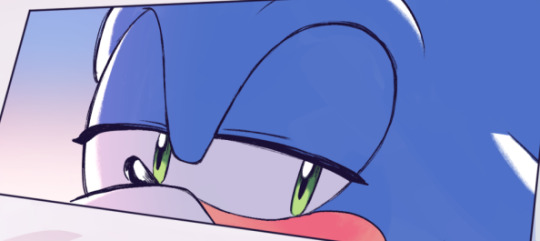
Don't do this too excessively unless you're trying to create a claustrophobic feeling - let it breathe with a medium shot or long shot after!
In film-making, there's a rule called the 180-degree rule that basically states that in a two-character interaction, there is an invisible line drawn between them. The camera does not cross this line and stays on one side. This basically keeps the characters on one respective side of the frame at all times to avoid confusing the viewer.
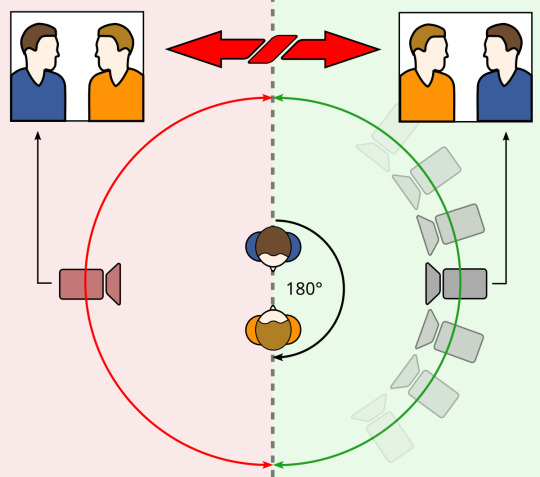
This is by no means something you have to follow for comics, but if you want to create something that is easier to follow, it's a good rule of thumb that I consider when drafting! It can also be broken depending on the effect you're going for.
Once I have a draft, I'll typically go into editing and changing things that don't work quite as well as I'd like. This can be done by yourself or you can get it revised by a friend, like I do!
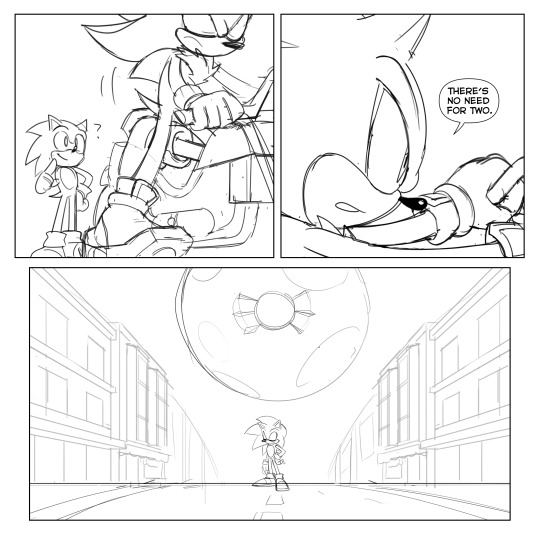
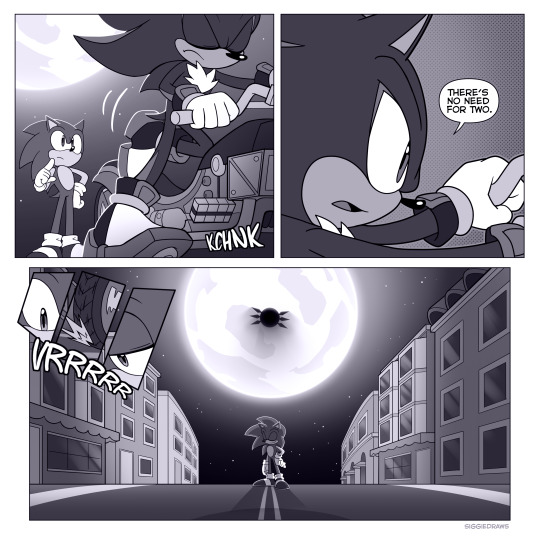
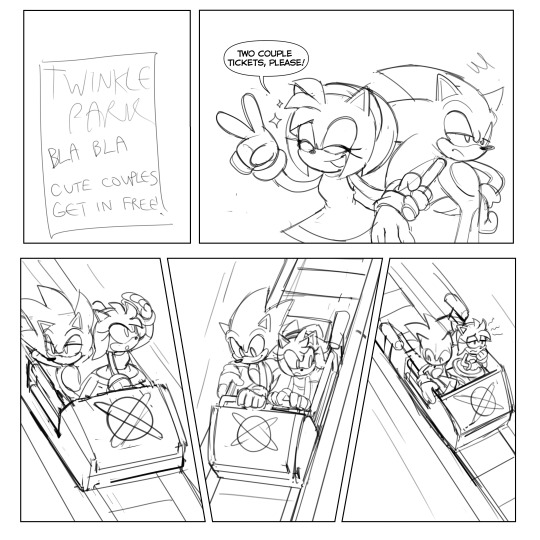
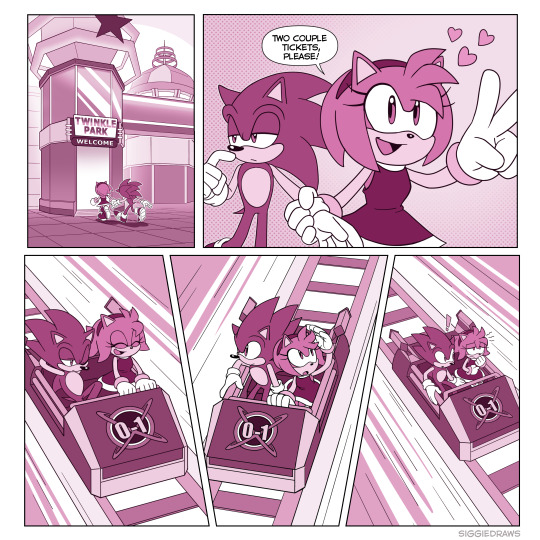
After the draft is finished, I'll get to lining and colouring. To be honest, it's not something I can teach so easily, but rather something that takes a lot of time and practice to learn. I typically draw the backgrounds with thinner lineart so that the characters stand out. Same deal with colouring - the characters stand out from the background colour-wise. There are multiple ways to do this, but for example, here I made the background have less colour contrast than the characters and stick to an orange-ish tone, while the characters are different colours from the background.
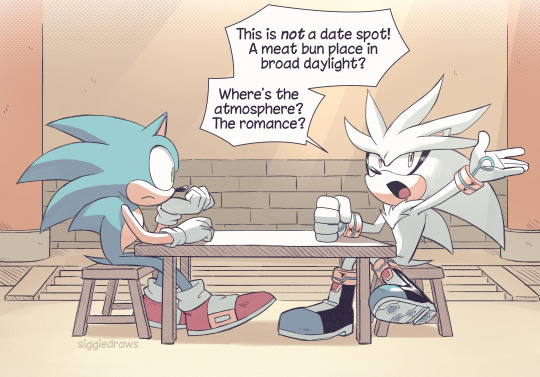
For speech bubbles, generally the words should fit the shape of the bubble to the best of your ability. The line spacing should be as close and compact as possible without touching the lines above or below. This is to save space on the page so that speech bubbles don't take up a majority. The tail of the bubble should point towards the character's mouth.
Avoid tangenting! This is when the very edges of two different things touch each other. It creates a flatter effect so you want to avoid it as much as possible.
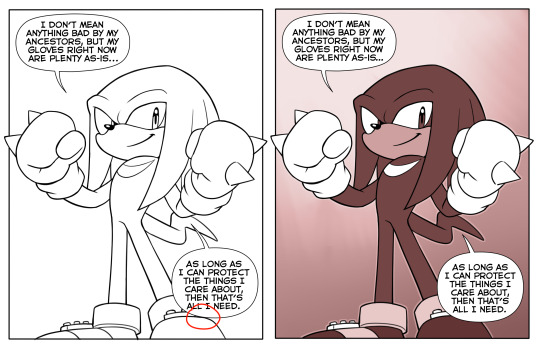
That's about all I can think of right now. Hope this helped!
#tbh i have also dropped comics before because it was too hard to get it to work#they take a lot of time and dedication#but you shouldn't give up!#ask#tutorial
83 notes
·
View notes
Note
what to do if there's too much dialogue in my story? how do i fix the 'not enough action'?
also what if my story's too short? it's supposed to be a novel
How Long Should a Novel Be? If you’re writing your first novel, the general rule of thumb for novel writing is a word count in the 80,000 to 100,000 range.
While anything over 40,000 words can fall into the novel category, 50,000 is considered the minimum novel length.
Anything over 110,000 words is considered too long for a fiction novel.
Each book in J.R.R. Tolkien’s The Lord of the Rings trilogy has an enormous word count, with the longest clocking in at over 175,000 words.
Despite their ongoing success, those epic sagas are the rare exception to general word count rules.
Typically, you’ll want your novel to be much shorter.
Within the world of literary fiction, different genres follow more specific word count targets:
Thriller: A good suspense story has to keep the plot moving to keep the reader engaged. The ideal count for a mystery is a 70,000 and 90,000 word novel.
Science fiction and fantasy: Sci-fi novels are an art in world-building. The need to invent a completely new environment makes this genre longer than others. A fantasy novel will usually have 90,000 to 120,000 words.
Romance novels: Not every love story is an epic like Wuthering Heights. Romantic plots now tend to be fun, fast reads. Some are as short as 50,000 words—the perfect book for a beach vacation. The high-end romance novel word count is 100,000.
Historical fiction: Fleshing out an imagined historical world lends itself to a higher word count, so historical fiction tends to be closer to 100,000 words.
Non-fiction: There is no definitive word count guide for non-fiction books due to the many subgenres. If you’re writing a non-fiction book, be sure to look up that category to find the length of similar books. For example, memoirs are generally 80,000 to 90,00 words.
Reasons Word Count Is Important in Writing. While there are no hard and fast rules on the amount of words a book needs, there are highly-suggested guidelines in the traditional publishing industry, especially for first time authors.
Unless you’re self-publishing, you’ll need to pay attention to how many words you use to compose your first draft. Here are 3 reasons why word count is important:
Shorter novels are more marketable. A literary agent and traditional publisher are less likely to take a chance on long novels when they come from a new writer. An adult fiction book is most marketable in the suggested word count.
Longer novels are more expensive to print. Longer books increase the number of pages that need to be printed. That makes them more expensive to print and a bigger investment.
Audiences expect a certain word count. Audiences are used to a certain story length and page count, so an unknown author can attract more readers by staying in the expected range.
Too Much Dialogue. Some stories rely heavily on dialogue. Others have very little. Most strike a balance somewhere in between.
To determine what's right for your own story, consider the effect so much dialogue has on the reader's experience.
What atmosphere does it create?
How does it impact the reader's understanding of the characters or the situation?
Keep in mind the role of dialogue and its limitations.
Some dialogue-heavy fictions fail because the dialogue is used carelessly.
Make sure you're not cramming information into dialogue when it might be more appropriate in narrative.
Also, be thoughtful when considering what to include in an exchange.
Crafting a scene is all about selectivity and you should include only what's important.
Example: Post-work chitchat might be commonplace in real life, but it's not terribly exciting in fiction. If the heart of the scene is to reveal a character's insecurities about the drive, we don't need fluff taking up space.
Since there's no set formula for how much dialogue you can use, keep an eye out for these common pitfalls and consider the effect of a dialogue-heavy read in the context of your work.
This should help you figure out if you've used too much or just the right amount.
Is it possible to use too much dialogue?
Here's one answer: No, a story can't have too much dialogue. Plenty of stories, including many by Ernest Hemingway and Raymond Carver, rely heavily on dialogue.
Of course, the opposite answer is true, too: Yes, it's possible to use too much dialogue. If the dialogue is unnecessary, it's “too much." That might happen in a story packed full of dialogue or one that has only a few lines of it. Exchanges should move the story forward and reveal something significant.
Relying on dialogue may be a stylistic choice, but an exchange shouldn't be an indiscriminate volley of words. It should have purpose.
More strategies for improving the dialogue in your own work:
Mix dialogue with narration. Long runs of dialogue can dislodge a reader from the action of a scene. As your characters talk, interpolate some descriptions of their physical postures or other activity taking place in the room. This mimics the real-world experience of listening to someone speaking while simultaneously taking in visual and olfactory stimuli.
Give your main character a secret. Sometimes a line of dialogue is most notable for what it withholds. Even if your audience doesn’t realize it, you can build dynamic three-dimensionality by having your character withhold a key bit of information from their speech. For instance, you may draft a scene in which a museum curator speaks to an artist about how she wants her work displayed—but what the curator isn’t saying out loud is that she’s in love with the artist. You can use that secret to embed layers of tension into the character’s spoken phrases.
Look to great examples of dialogue for inspiration. If you're looking for a dialogue example in the realm of novels or short stories, consider reading the great books written by Mark Twain, Judy Blume, or Toni Morrison. Within the world of screenwriting, Aaron Sorkin is renowned for his use of dialogue.
Tips for "not enough action"
Create visuals. Use action in a concise, impactful manner in order to deliver strong images for the audience. The clearer your scenes are, the more easily the audience can understand and absorb them. You don’t want readers or viewers to be hung up on seemingly impossible details or sequences that don’t flow. Visuals that get right to the point and can be quickly understood are best for conveying action.
Technical writing style. Whether you’re writing descriptive paragraphs in a novel or stage directions in a script or screenplay, you must be able to articulate the scene you envision in your head without wearing down your reader with technical drivel. Balancing specific details of your action sequences with a propulsive story isn’t easy to do. Sometimes a great action sequence doesn’t come together in a first draft, so focus your revisions on clarifying each action and providing vivid detail without besieging your reader with dull technical terms.
Striking a balance. There are no hard-and-fast rules about when and when not to blend dialogue, action, and narrative. To weave them together well is to find your story's rhythm. But there are a few questions you can ask yourself about your story, especially in the rewrite stage, that can help you know which elements are most effective for a particular scene, and which might be better used elsewhere.
Ask yourself:
Is the story moving a little too slowly, and do I need to speed things up? (Use dialogue.)
Is it time to give the reader some background on the characters so they're more sympathetic? (Use narrative, dialogue, or a combination of the two.)
Do I have too many dialogue scenes in a row? (Use action or narrative.)
Are my characters constantly confiding in others about things they should only be pondering in their minds? (Use narrative.)
Likewise, are my characters alone in their heads when my characters in conversation would be more effective and lively? (Use dialogue.)
Is my story top-heavy in any way at all—too much dialogue, too much narrative, or too much action? (Insert more of the elements that are missing.)
Are my characters providing too many background details as they're talking to each other? (Use narrative.)
Whether we're using dialogue, action, or narrative to move the story forward, any or all 3 of these elements are doing double duty by revealing our characters' motives.
Your story's dialogue can reveal motive in a way that's natural and authentic because whether we're aware of it or not, we reveal our own motives all the time in our everyday lives.
And to understand a character's motive is to understand the character.
Sources: 1 2 3 4 5 6 7 ⚜ More: References ⚜ Writing Resources PDFs
More Tips & References on Dialogue
On Narrative Pacing
Hope this helps with your writing!
#dialogue#novel#word count#writeblr#writing tips#writing reference#on writing#writing advice#writing inspiration#writing ideas#dark academia#writers on tumblr#literature#writing prompt#spilled ink#creative writing#writing resources
94 notes
·
View notes
Text
How to write good dialogue
Almost every story needs dialogue - obvious right? Well, this post is about the not-so-obvious sides of conversations. I've struggled a LOT with snappy and realistic speech, so I've made it my mission to collect some handy directives. Here is what I found:
Contents
Information Dumps
Setup And Payoff
Characterization Through Dialogue
Three Simple Questions
Four-Sides Model
Depth
About Answers
Sources And Credits
⮮ Let's go! (^▽^) ⮯
Information Dumps
Everybody knows them, everybody hates reading them. But how do we avoid them? Something really clicked for me when I understood context. If your character talks about something that happened in the past, they don't need to explain what happened. They were there. Here's an example:
"It would be nice if we at least got a B for that paper. Since I will go to college next year, I feel that this is important to me."
The speaker and the listener should be aware of the exposition (regarding their last year at high school). During dialogue, these conditions go without saying.
Setup And Payoff
Instead of dumping everything at once, let the reader guess what's happening. This is done by mentioning something that is not answered right away. Also dropping hints can increase tension.
Scene 1 "Why do you always carry that with you?" she asked and pointed at the box cutter. Her friend eyed her with suspicion. "For cutting." "Yeah, but why?" "Might come in handy sometime." Scene 2 An ice cold shiver ran down her spine as her fingers felt around the bag, searching for the familiar shape. There was nothing. The other tossed the thing onto the floor between them. "Care to elaborate?" She couldn't have known. "How could you!"
Someone definitely has a secret here that they don't want uncovered. It makes the reader speculate: Does she carry the knife to defend herself or does she plan on hurting someone with it?
Characterization Through Dialogue
The general rule of thumb is: Show not tell. If a character is shy, self-absorbed or chaotic, make them act like it. Also, readers take part in the characterization of your protagonists. Make them guess why a character acts a certain way.
"C- can I have your pen?" She twirled her thumbs and looked at the ground. "What the hell, no!" Disgusted, he brushed off his hands on the front of his jeans. "I'mma better disinfect that."
Notice how the girl is stuttering and the boy has a loose tongue. Mannerisms help identifying traits in a character. Everyone has a distinct way to speak (e.g. relaxed, polite, malignly) which makes it easier to tell them apart. Sometimes there is a difference between speech and behavior. This can be quite useful to highlight conflict inside a character.
Three Simple Questions
Who wants what from who?
Why now?
What happens if they don't get it?
These questions ensure plot consistency. For question 3 the only other outcome is conflict. Conversations thrive off of conflict and it is of benefit to have a supplicant and potential provider for a solution. It's basically intention versus obstacle.
1. She wants to be his wife. He doesn't want a marriage. 2. She is pregnant. 3. She needs to provide for a baby all on her own.
Tadaa, a conflict ensues.
Four-Sides Model
The four-sides model is a theory on communication. It assumes that a message has four distinct ways of being conveyed:
Facts -> data, facts, truth and relevance
Self-Disclosure -> explicit and implicit information about the own mindset; likes, dislikes, opinions
Relationship -> information about whether the person is liked or detested; approval and disapproval; "I assume you have [this] opinion of me"; body language
Want -> a direct attempt to influence the behavior of another person; advice, desire or instruction
Since this is highly technical stuff, I'll provide you with an example:
Customer: "I always drink my coffee black." 1. Fact: The coffee I drink is black. 2. Self-Disclosure: I like black coffee. 3. Relationship (POV of the waiter): Did I do something wrong? OR It's their fault! They ordered the wrong thing! 4. Want: Bring me black coffee.
Controlling the message through sender and receiver gives a new level of influence to an author. The relationship-level is the bottleneck in a conversation that holds the most potential for misunderstandings. I'm trying to be aware of it when I write subtext (see below).
Depth
On the nose dialogue is what we want to avoid at all costs. For this reason subtext is created in stories. Read this:
Scene 1 A: "I like you." B: "Nah, I don't like you back. You're so annoying." A: "Ouch, that hurts. I'm not sure if I heard that right." B: "We were never friends. Go away."
This is not how conversations work. Thankfully, dialogue like this is not entirely useless. It conveys what the characters really want to say. The challenge is to think of a way to not say the thing but keep a similar meaning.
The true meaning behind the dialogue is called subtext (scene 1). If I don't know how to continue after a certain line, I write down the subtext first before I decide on how to paraphrase it.
Finally, I add a fitting description of expression and body language if needed. I try to keep it short and simple.
Check this out:
Scene 2 She tucked her hair behind her ear. "I need a ride home later. Are you free?" -> I like you. "Sorry, all seats' re taken," he said without looking at her. -> Nah, I don't like you back. You're so annoying. "Uhm, okay. But I'm small. You could fit me in the footwell, honestly." -> Ouch, that hurts. I'm not sure if I heard that right. He leaned forward as if he had the urge to stand. "Ha, funny. But no, I'm not planning on doing something illegal tonight." -> We were never friends. Go away.
A character's action depends on their own intention and the other's response. I feel it is easier to keep track of what's happening behind the curtains when it's written alongside the dialogue.
Simultaneously, you can keep habits and traits in check. Does the the character apply all criticism to themselves? Are they disregarding or constantly marginalizing others? Do they worry only for themselves or solely for others? Subtext truly is the most powerful tool in conversation-writing.
About Answers
Did you know that you don't have to answer every single question? In fact, there are two other ways to show an emotion without telling it.
The first one is called sidestepping. The character ignores the posed question and carries on with an entirely different topic.
A: "Do you still love me?" B: "We should get going."
It's very obvious, right? By sidestepping the question, we can assume that the character is uncomfortable or angry with the other person.
The other way to answer is actually a bit paradoxical. Through silence, a great variety of emotions can be displayed. It is recommended to refrain from actually describing silence with words like "he remained silent", "he refused to say anything", "he never responded".
- The laptop hummed. - The birds chirped in the trees. - She felt her legs going numb from sitting in an uncomfortable position. - His eyes wandered around, searching the parking lot for a familiar face.
It feels more natural to explain the things that grab our attention when we sit in silence.
This is it, folks. That's all I could find on the topic - for now. If there's anything missing, I'd love to hear it.
‧͙⁺˚*・༓☾ Anyway, thanks for reading, I hope this helped ☽༓・*˚⁺‧͙
My sources are this and this video as well as this article.
Also a big thank you to @zoropookie for helping me with the colors ⸜(。˃ ᵕ ˂ )⸝♡
218 notes
·
View notes
Text
Chapters-Writing Advice
I, evidently, have a problem figuring out how long a chapter should be. But, some rules of thumb I've developed for deciding which scene is last:
Does the last scene pay off what was set up in the first one? This gives a sense of completeness or cohesiveness to the chapter. This could be a chekov's gun firing, building off a theme that the first scene introduced or reminded, echoing early lines, resolving a problem introduced, the waning of the fallout from a character learning something in the first scene, or any number of things.
Time skips. Pretty straight forward, though typically on a longer scale than the time skips between and within scenes.
The extent of an emotional swing. Chapter breaks can sometimes give a feeling of a reset, since readers tend to be more likely step away and come back then. Interruptions weaken the potency of a building emotions. So, in the rollercoaster of a plot, an easy divide is after the story reaches an emotional peak/valley so that it's a continuous direction. This could be building up to a crescendo of tension, excitement, drama before more (minor) falling action in the next chapter, or ending at a calm before the storm. Though this is a deep simplification of how to shape emotional changes through the levels of story, scene, and paragraph.
Dramatic final line. Ohhh I love these so much. Gives a single event, dialogue, theme, exposition, whatever, extra emphasis. Great way to get a reader hooked, and give them a pause of anticipation, theory crafting, breath before continuing. Whether the reader sits back and really ponders the significance, or is immediately flipping to the next page to find out, a chapter ending can cause a particular exchange/reveal/decision/etc to stick out.
POV changes. Depends if this is a technique you're using, but generally clear divides in whose head the reader is in avoids any confusion, and chapters provide an extremely clear demarcation. This can also be used in the sense of what character/s are getting the dominant focus in the chapter, particularly if you have a large cast and rotate the spotlight.
Obviously, a lot of other factors will come into how long each chapter is. Scene length, reader time investment, editor advice, etc, but these generally guide my process. And sometimes it really might just be an arbitrary decision based on page numbers because some times a reader doesn't want a 60 page chapter cough cough.
#writers#writers on tumblr#writing inspiration#creative writing#author#writing advice#writeblr#writing#fiction#long fiction#something to nom on
36 notes
·
View notes
Text
writing tips masterpost
hello to my loyal tumblr followers... i am often asked to give writing advice but usually when people ask me this i'm nooooot completely sure what to say despite having a ton of advice to give. it's such a broad question when there are so many different things i can advise on, right? so i thought i'd make a sort of writing advice masterpost where i can compile the tips that i think people specifically in fandoms could benefit the most from hearing, OR that i wish someone had told me when i was still finding my footing as a writer.
hopefully this will be helpful to you. i am putting all of the advice under a read more since this is going to be a long one. let's roll!
✬ paragraph breaks are your friend
the fastest way to get me to stop reading a fic is if i click in and see that there are NO paragraphs made and the entire piece is in a huge block of text. no matter how good your work is, i just can't read it at that point. the giant paragraph makes me get lost, i can't focus on anything... it's a huge no.
the trick is you want your paragraphs to sort of act as a guide for your reader, taking them through the story, keeping them engaged. do not be afraid to do short paragraphs! i can understand wanting to shy away from one or two sentence paragraphs for fear of not having "enough substance" in your work, but the truth is, a thousand short paragraphs is ten times easier to read than a huge block of text.
realistically, you want to have a good amount of variety in your paragraph length. variety is key. readers will notice when your work gets formulaic, and some people will like that, but for others that can turn people away from your work. but don't force it! a paragraph should end at the end of a statement, or if the paragraph is getting too long then cut off the thought and continue in the next paragraph with a transitional phrase.
as a general rule of thumb, you want lines of dialogue by different speakers to be put in separate paragraphs. you also want to avoid doing huge chunks of narration or exposition in the same paragraph as you introduce a new speaker. just make a new paragraph! no big deal. i guarantee you your reader will be way more engaged and nobody is going to come at you for doing more rather than less.
✬ make sure the reader knows who is speaking and when
you don't have to end off every line of dialogue with "she said" and in fact i would really recommend you don't. but you ALWAYS need to have some kind of indication in the text as to who is speaking, otherwise the reader can get lost.
this doesn't necessarily mean that you always have to explicitly say who is saying what, though. if it is obvious in a scene who is saying something -- so for example, a scene where there are only two characters talking OR the dialogue has some kind of phrase, statement, etc that makes it obvious who the speaker is -- then in that case you can just let the dialogue speak for itself. sometimes in writing less can be more. you disrupt the flow of a scene if you start to exposit unnecessarily when the reader could reasonably work something out for themself.
✬ "said" is your friend too
related to the last piece of advice, here's another note: don't shy away from using the word "said".
don't overuse it, either. obviously, you don't want every single line to be "he says" "she says" back and forth, especially when they might be asking questions or shouting, in which case the word "said" probably isn't all that applicable at all. but it's a nice default. if you catch yourself busting out the thesaurus, my recommendation? quit it. just use said. it's not going to hurt you and the reader isn't going to mind.
but yeah, in the event that a character is raising their voice, whispering, inquiring -- there are tons of other words you can use in lieu of said and then an adverb. it's just context-dependent, and also, you don't really want to lean too far one way or another. like i said, variety is key. too much of the same breaks immersion.
✬ if you wouldn't say it yourself, probably don't use it in writing
another related tip. look, i get it. you want to spruce up your writing with synonyms. but the fact of the matter is that a lot of these words that "mean the same thing" on paper actually have wildly differing connotations and if you don't understand what those are you're going to look kind of silly whipping out a word you just found off the internet. we can usually tell, too.
your vocabulary will naturally grow and expand as you continue to read and learn. you don't have to try and force it to seem smarter in your writing. people who can write compelling prose and dialogue without throwing in fancy words they barely understand look a lot more intelligent than people who have a thesaurus at the ready 24/7.
✬ if there's a simpler way to say it, take it
this one can be sort of style-dependent, so if it's not your cup of tea then feel free to take or leave this tip, but in my opinion, taking a whole seven-line paragraph to describe a simple action wastes both your and the readers' time.
how many times have you read a fic where the main characters are having a conversation with these long rambling paragraphs between lines of dialogue? sometimes this makes sense! if you were writing a death note fic it would absolutely make sense for light or L to be pausing every few seconds to carefully analyse their opponent's move... but that's not always the case. sometimes characters are just making small talk.
i'm not saying you can't show off. you should show off where applicable. but there's a time and place. sometimes a scene benefits more from you taking the easy way to describe something and moving on. flowery language is great, but if you're meandering too much the reader will lose interest and attention.
✬ a metaphor is useless if nobody knows what it means
writing is subjective and highly personal. write for yourself first and foremost, and use the metaphors that feel right to you -- but the best metaphorical pieces, to me, are the ones that people can understand and identify with.
you've read a story like that, haven't you? with a reoccurring theme or motif that comes back into play at the end in a way that makes you feel so satisfied and complete? THAT'S what you aim for with literary devices like that. if you write a story that nobody can understand, with metaphors that just don't make any sense -- then you haven't really successfully told a good story, have you?
i understand wanting to have a magnum opus. i think it's easy to fall into the "misunderstood writer" mindset where you want your pieces to be so magnificent that only the likeminded will get it -- but writing is a form of communication. metaphor is just another means with which we can illustrate how we feel. you WANT your readers to understand what you're doing with the metaphors, you WANT the people who step away from your story to know what you were trying to say. you don't have to be obvious, just make it good. make it something that can be reasonably drawn from the text.
at the end of the day flowery language is just flowery language. that doesn't actually make your story good.
✬ grammar intermission
(.) period/full stop: used at the end of sentences. oftentimes not used at the end of sentences in dialogue, because lines of dialogue are considered a fragment of a larger sentence. use a period/full stop at the end of a line of dialogue if the dialogue is followed up by another complete sentence. example:
"i just went to the store," he said, scratching his head.
"i just went to the store." he scratched his head.
(,) comma: used in the middle or to separate different clauses (parts/sections) of sentences. used for incomplete clauses, AKA sections of the sentence that could not function as individual sentences. also used to indicate a slight pause. example:
she reached for the ripest banana, plucking it from the bunch.
a comma can also be replaced by a conjunction like "and" or "but". example:
she reached for the ripest banana and plucked it from the bunch.
(;) semi colon: used to separate different complete clauses in sentences, AKA sections of the sentence that are related but COULD function individually as their own sentences. example:
he sighed as he looked out the window; it had been so long since he stepped outside.
not to be confused with
(:) colon: used at the end of a line that leads into or introduces another line. example:
his fingers drummed restlessly against the window sill. it was finally happening: he was finally leaving this place.
(-) hyphen: used to connect compound words like three-years-old or hyphenated surnames like jones-smith.
(–) en dash: used to indicate ranges of time or distance, like 3–4 hours.
(—) em dash: a girl's best friend. slash j. but an em dash is used to indicate a few different things: an abrupt end to a thought or sentence, a "cut-in" where you interject something tangentially or unrelated before returning to the original thought, or a diversion in the sentence/thought. examples:
"no, listen, you don't understand—"
he scowled—an ugly look on his usually handsome features—and told her to be quiet.
it's not like she had wanted it to go that way—but when had it ever mattered what she wanted?
(()) parentheses: used to add additional context, information, or a semi-unrelated thought that would break the flow of an ongoing sentence without completely taking the reader out. example:
"no, i'm sorry. i just forgot to call you this morning," he said, looking away. (in truth, he'd sat by the phone for fifteen minutes trying to psyche himself into it, but hadn't been able to muster the courage.)
✬ show don't tell, and tell don't show
show don't tell is one of the classic pieces of writing advice that i do, often, think is correct -- but it's a little more nuanced than just never telling your readers what a character is thinking. you want the work to speak for itself without you implanting messages or themes into the reader's brain. at the same time though you don't want them to be doing too much work because it breaks immersion.
this ties into what i was saying above about simpler being better sometimes. you want to be concise especially in scenes that might call for it. a fight scene should be quick and snappy. no need to dig into the physical sensation of being enraged -- just say the character is pissed! but if a character is having a meltdown or panicking, you can get SO much more out of describing how that feels than just outright saying it.
✬ remember your perspective
another huge thing with show don't tell is that you don't want your character to be able to objectively say what everyone else is thinking and feeling -- unless that makes sense for them within the context of the story. really dig into it. DOES the character have a reason to know what their opponents, friends, etc are thinking? how well do they know the other characters? how attentive are they to the emotions of those around them?
it's better to focus on descriptions than labels in that case. say what face a character is making, describe their body language or tone. your character can have impressions, just make it clear that those ARE their impressions. and let your character be wrong! they do not have to be a completely objective source of information.
✬ when it comes to representation, if you aren't confident you can do it well, don't do it at all
i'm one of those people who's kind of of the opinion that white or cishet or otherwise systemically advantaged people have no place being the loudest voices in conversations about representation, least of all AS the representatives. if you are someone with systemic privilege and you choose to portray someone who is oppressed -- that's not necessarily a bad thing. but you need to be willing to do your research and have a sensitivity reader, and you have to be ready for people to say you did it wrong.
not much else to be said about that. your voice on the matter isn't actually all that important. there are people from the demographics involved who DO have stories to tell about themselves that will be MUCH more valuable than your perception of them, so it's honestly better to just let them tell it. that's how i feel.
✬ don't break the rules unless you know how to follow them. in other words, your rebellion should be obvious
a lot of times i see people breaking grammar or other rules and citing "stylistic" choices as their reasons why. which is all good and well, to an extent -- but you want it to be very clear that you ARE breaking the rules on purpose in a way that adds to the artistic merit of your piece.
if you don't know the rules, then it really just comes across like messy work. you both have to know how to apply the rules, and also how to break them in a stylistically significant way. if it doesn't make sense for the rules to be broken, if it says nothing... it's honestly better to just follow them. that's my take.
✬ don't be scared of names and pronouns
i said before that you want variety in your work, and that is very very true -- but it's also true that certain words like names, pronouns, etc will sort of blend into the background in writing. people don't notice them. that means if you're using a name or pronoun a lot in a scene to make it clear who exactly is being referred to...
hey. look into my eyes. breathe. it's okay. you do not have to resort to highlighting arbitrary characteristics of the characters. i know. just breathe. it's okay. use their names. they have them for a reason. it's all good.
this isn't to say that you SHOULDN'T do that, just do it when it makes sense to. if height is something the characters are noticing then use "the shorter boy". if age is relevant, eye colour, hair colour, whatever -- go ahead and use them. but don't be excessive with it. i should not be having to read the bluenette more than i'm reading shuichi's actual goddamn name.
✬ read
this is the huge one. reading other works informs your writing. it teaches you skills and tricks you can use. it helps expand your dialogue and your world view. it might even highlight to you things you do too much of in your own writing. read, all the time, whenever you can. it doesn't have to be books. it can be fanfic, articles, whatever -- just keep reading, because you will be passively absorbing knowledge during that time and it'll help you grow as a writer.
✬ practice
BOOOOOO TOMATO TOMATO TOMATO! SHE SAID THE THING SHE SAID IT!
but listen, it's literally just true. i write almost every day for at least a couple of hours and i have been on a trend of consistent growth for the past five years. go read my fics from 2019 if you don't believe me. i've grown fast and i've grown constantly. you just DO grow through constant practice, even if it doesn't always seem that way.
not only that, but you start to build confidence too. writing a lot helps develop those muscles to a point where you start to realise that you ARE that good and you DO have that dawg in you. or whatever. you just have to keep at it. you're not going to magically improve thinking for six months about how you want to be a better writer without practicing anything about it.
✬ yeah, betas are good
you want to have a good editor. i know that that can feel like having someone ELSE be the reason your piece is good, but that's genuinely not it. a beta reader is a second pair of eyes on your work, someone who can tell you about the issues and mistakes you're missing. they'll tell you when something doesn't make sense. they'll point out your punctuation errors. you don't NEED to have a good editor for every crummy little oneshot... but it's good to have one.
✬ numbers are fine and all but don't compare yourself to other people
i think almost everyone in some kind of creative pursuit wants to get some kind of acknowledgement for it. we want to be the best we can be, and it can be discouraging to receive utterly no validation along the way! i get it!!
just don't get caught up in crunching the numbers. you are not as good as your fanbase is. you alone know your skillset and you absolutely should not say "well this other writer got THIS much attention" because that'll just wear you down. it really will. external validation will only keep you going for so long, and you'll always end up needing more. you HAVE to build your own personal confidence first or you'll crash and burn.
✬ read your writing out loud
there is no quicker way to see if something is wonky in your prose than reading it out loud and seeing if it makes sense verbally. i highly recommend this to anybody who struggles with sentence flow. it's a good one.
✬ yippee hooray!
🥰 and that's what i've got for now. thank you if you made it this far, please take all these tips as you will, it is all subjective of course, these are just the tips that help Me the most when i sit down to write something.
please feel free to ask me for additional advice (on specific topics if you could!) at any time, i love encouraging new writers and i am passionate about writing so i will gladly offer support in any way i can, including beta reading works for anybody who might need that.
take care now 💖
340 notes
·
View notes
Text
BLOG INTRO WOOHOO!!!
Hiii!! I'm Prismo (@prismo-pelican) I go by any pronouns and I'm in my early 20s!!! This is like... The first roleplay blog thingy I've ever done PLEASE have patience with me!!!
This is a roleplay/ask/parody blog for my silly little Phighting OC, Health Potion! His dialogue will be in red while general narration will be in normal text! (Example: "Wow, I sure do love not dying!" He gives you a thumbs up!) This post miiight be kinda long, but I hope it's not unbearably long for people to read....
RULES!!!
No NSFW stuff! I would prefer it if there was nothing suggestive in my requests!
No romance prompts, please!
Canon and OC interactions are encouraged! I'm not picky, I'd love to see HP interact with anyone.
You're allowed to traumatize him. Go. Be free. (I'm ok with stuff like gore!)
Basic DNI (Homophobes, Transphobes, Sexists, Incels, Proshippers, Darkshippers, etc) and stuff. I know I can't stop those kinds of people from interacting with me if they want to, but I want to clarify that they're not welcome here.
Just don't be a jerk!
Other than that, feel free to interact with me! I'd love to get more engaged with roleplaying communities and the phighting community as a whole! :D
WARNINGS!!!
Just some general Content Warnings that are probably gonna be prevalent themes with HP!
Abuse. Specifically Physical and Psychological
Mentions of scars in general. Not SH scars, but the topic of scars and their origins might be mentioned.
Alcoholism/Alcohol mention in general
Pretty sure some other warnings just go with Phighting Lore in general like Cult Activity and Violence. Idk if that's all of them, but those are the two big ones I know are there. Stay safe out there!
And now, under the cut, will be CHARACTER INFORMATION, PREDETERMINED RELATIONSHIPS, APPEARANCES, and TAGS!
CHARACTER INFORMATION!!!
PERSONALITY: HP is an anxious, awkward overthinker with determination and a stubborn soul. He sticks to his ideals and beliefs religiously and as a result, he never gives up on trying to help people. He firmly believes that all people are innocent until proven guilty and that all innocent people should not be without a chance to receive support. Because of these beliefs and how closely he sticks to them, HP offers healing in any way he can pretty much for free. The only thing stopping him from fully committing to the role of a healer is his fears and inability to brave dangers alone. LORE: HEALTH POTION (HP for short) is an old friend of Coil's with quite a complicated history... His backstory's a little long, so I'll do the best I can to summarize!
Health Potion formerly went by a different name and appearance as a Blackrockian partner in crime to Coil until one day when he was caught and used as a test subject for an experimental brain chip that wiped his memories. For a bit, he was placed as a subordinate to Subspace, who was anything but kind to him (and probably downright abusive) because he knew HP still wasn't fully "broken" and didn't want yet another healer to become an issue for him. Ironically, this treatment is what led HP to run away from Blackrock after he somehow found out about Medkit's successful escape before his own.
To get back on his feet, Health Potion worked as a healer for underground fighting rings and completely changed his appearance in the process, which is where he met Coil again for the second time. Recognizing HP, Coil rekindled their friendship and now helps HP in trying to uncover forgotten memories.
Currently, HP and Coil share a hiding space, and (to my personal headcanon? I think?) share an apartment with Skateboard.
(Note: HP's brain chip is not traceable due to connections to a friend's OC, Kazoo, who introduced him to Medkit and paid the medic to tamper with the chip. I just didn't put it in the lore summary to keep it as short as I could. :3)
HP prefers He/Him pronouns! TRIVIA:
HP's gear has been modified so heavily that he barely even counts as a potion anymore. It's more like an Alchemy machine he uses to make much more than just Health Potions, though that is his gear's main function.
HP experiences intense migraines and chronic headaches thanks to the chip in his brain.
Due to the intense abuse Health Potion faced in Blackrock, he developed a chronic phobia of the dark and loneliness.
(There's more, but I think it'd be more fun for people to discover the rest through asks and roleplay threads!)
PREDETERMINED RELATIONSHIPS!!!
HP and Coil have a pretty solid friendship! Even though HP isn't how he used to be, he's still Coil's friend, and a loyal one at that. He admires Coil's overwhelming confidence and is slightly horrified at the sheer lack of consequences he's faced for being a major thorn in Blackrock's side. HP would follow Coil anywhere. In his eyes, there is very little Coil can do wrong. Skateboard and HP are pretty good friends, too! After all, any friend of Coil's is a friend of Skateboard's and HP is very thankful to have Skateboard as a friend. He thinks of Skateboard as a supportive figure and really appreciates everything he's done for him. Subspace terrifies HP. And he is very vocal about this. He sees Subspace in his nightmares and can always feel his oppressive presence in the back of his mind. He can say he doesn't remember what happened to him all he wants, but it's hard to forget the reason you can't feel like you used to. Because of HP's fear of Subspace, Biografts in general REALLY intimidate him. HP and Medkit are on neutral terms. They really only spoke once, but they have a mutual understanding that they were hurt by the same person. And from that, there's a little feeling of respect. At least for HP. HP and Kazoo (@orbital-strike-flute) are best friends! Platonic Siblings, even! Who argue! All the time! Constantly! They would probably die for each other! All other characters are people HP has either never met, or has only heard about.
[He also has relationships with other OCs that belong to other friends, but I'm not going to put them here! HP might mention them by name, though, if my friends are comfortable with it and the ask or reply I'm doing or whatever calls for the opportunity!]
APPEARENCES!!!

[Current HP Appearence]

[Past HP Appearence]
TAGS!!!
coming right up - Ask Answered
health POSTion - Standard HP Post Tag
iron cafe shenanigans - IC Post
after hours - Lore-Related Post
hps not home - OOC post
phighting/phighting oc/phighting rp/etc. - Generic Tags
#health POSTion#hps not home#after hours#phighting!#phighting oc#phighting roleplay#phighting rp blog#phighting ask blog
5 notes
·
View notes
Text
Earthly Objects

Introduction
If you want to minimize game spoilers, you should actually start here: Trickery.
...
Yes, I'm making another new main post, but this one is simplified back to one main post with links to the more in-depth past versions. Now we have more pictures too!

"You can't just manifest and cause trouble, there are rules." -Crowley, Good Omens 2, Episode 5 (The Ball)
...
Earthly Objects is a findable layered puzzle game in Good Omens 2. The characters are playing it. A curious audience member can play it by trying to figure out how the game works.
The game consists of some notable patterns that start to resemble an expected script from the characters. Hence, there are rules. These rules can and will be broken.
...
Crowley
Crowley is astoundingly impressive at how he plays this game compared to everyone else. He is the best source for clues on the many complex mechanics, and he plays at such an advanced level, he makes moves across the various time periods. You could probably make and find a joke about him being this game's GOAT (Greatest Of All Time).
...
The Name of the Game

In episode 1, The Arrival, Michael performs an extensive touching sequence on a seemingly ominous matchbox. Once this sequence is done, Uriel says, "That's definitely an earthly object."
This name is meant to be found. Gabriel said "material objects" in season 1, episode 2. Uriel said "material object" earlier in the scene described further above.
It's clear the story cares about the likes of Heaven, Hell, and Earth, so this name is better suited than something like Tangibility Thing or Material Objects. The name Earthly Objects is special and linked to the story of Good Omens or Good Omens 2 itself.
This name also broadens the idea of what can be in play since not every "touch" in this game is physical. Touches depend on context.
...
The Rule of Three

Earthly Objects loves the number 3. It is everywhere in the game and everywhere in the story. The standard set of points is 3. Even with Crowley's Threshold Tricks, the number 3 can still be found as the number of primary multiplicative adjectives required.
...
The Rule of Thumb

Thumbs are most evidently relevant to how Crowley performs his Threshold Tricks, and I generally look to them as a guideline for other parts of the game, especially if I'm trying to find out whose or which touch might get priority.
...
Points
A standard set of points is 3.
These things are generally composed of 3 points earned in a developed rhythm based on the context within the story.
The characters often aim to have at least one earthly object touch involved between using thresholds and earning dialogue points.
I cannot name all the sets, but I've seen and found enough, that's still my understanding of the main game in play.
One earthly object touch is worth 1 point. Standard dialogue points can be earned through "Hello" or an approved equivalent, questions, names, and numbers.
If two characters interact, the game usually wants each character to earn at least one point. Other scenes are meant to stand out when not adhering to this rule to find the game itself or as part of its broader puzzles.
Solo scenes still often require at least 3 points from that one character.
Points are dependent on context, timing, and placement around thresholds.
Things grow ever more complex with more characters involved
...
Touchable Earthly Objects
Earth has objects, often thought of by humans as tangible objects and referenced by the story as material objects. In this story, earthly does not strictly mean solid, and touch does not strictly mean direct skin or clothing contact. They are the most easily evident and likely common methods. The touch depends on how it is done and the nature of the object in question. Illusionary touches count for something at some given times, but that is highly advanced play I haven't fully solved.
Checking a watch for the time is an earthly object touch because that is how you use a watch on Earth. Looking through a window is an earthly object touch because people look through windows to see things on Earth.

We see three earthly objects in the show's opening before Earth even exists. Those objects are a crank, a scroll, and a book. One of them, the book, is touched through a supernatural method but still touched.
An earthly object can be held during a character interaction and still count in many contexts.
These are basic earthly objects, for a few examples:
Chairs
Windows
Tables
Walls
Books
Mirrors
Cups
Doorknobs
Bodies of living natural beings (humans and goats for example)
...
Blurs
Blurs have multiple functions within the game, and an audience player must consider the surrounding context for their intention.
Among such functions is pass or share. For me, this part became evident in studying how window looks work.
...
Thresholds

Thresholds are largely understood to be doors.
Doors have earthly objects on them, such as doorknobs, door handles, locks, push plates, shades, windows, mirrors—even the astragal for double doors. The panel serving its function as mainly the door is different. That is the threshold and not an earthly object. This same idea likely applies to a door frame as well or is dependent on the context of how the door frame is touched.
This story has other non-door thresholds, such as the edge of the sidewalk.
Window frames are thresholds and windows themselves have a remarkable threshold component when it comes to looking, with a link explaining such a thing further down.
...
Threshold Tricks

As noted, Earthly Objects is a puzzle game.
The Threshold Tricks are 6 special findable puzzles that are advanced moves performed by Crowley with various forms of assistance.
Personally speaking, I love them though one in particular, The Pocket Trick, is especially difficult and the source of many frustrated complaints.
These puzzles have at least two rounds of play for an audience member.
Round 1:
Round 1 involves finding the given Threshold Trick. It is complicated. There should be a Single, a Double, and a Triple. It should have a name. Five of the six Threshold Tricks should have a core concept with The Pocket Trick missing one. The core concept is the simple idea the Threshold Trick is based on. In Round 1, an audience member is only required to play the game by checking frame-by-frame during The Perfect Entrance Trick due to its quick movement, blurs, and a thumb tip touching a window pane.
It is still very challenging because a player must be familiar with the events of the story and put a lot of thought into these core concepts to solve the puzzle.
Round 2:
Based solely on my own experience, I admit, Round 2 starts with a second look at The Pocket Trick in case you missed something since there's a decent chance you're missing core concept itself.
To play Round 2, an audience member is definitely required to play the game by looking at things frame-by-frame because you can't discover the Tied Hands any other way. Well, at least you probably wouldn't. The Tied Hands are just the start of realizing the scale of The Pocket Trick and its giant impact on so much else within the Earthly Objects game.
Here is a post I made about them:
Threshold Tricks
Their names are The Perfect Entrance Trick, The Bigger Thresholds Trick, The Pocket Trick, The Sunglasses Trick, The Door Trick, and The Window Trick.
The Threshold Tricks require a minimum of 6 points due to their involvement with thresholds and even a specified format of a primary Single, Double, and Triple.
Aziraphale may not manipulate thresholds on the same level as Crowley, but he is aware and involved in quite likely all of the Tricks. In fact, at the story's end, he actually has his own part to play with his own special Magic Trick linked to The Door Trick with its own special name of The Door Catch.
Muriel is Crowley's trusted assistant in the last touches of The Bigger Thresholds Trick and The Pocket Trick. The advanced play clues of this game suggest a deep trust between these two characters.
...
Awareness
Crowley and Aziraphale seem to be more aware of this game's existence than most other characters though Muriel has some well-hidden advanced play.
Generally, the characters play as if doing so sub-consciously.
Even so, there must be some kind of split or layering for Crowley, Aziraphale, and Gabriel, allowing themselves to still be surprised by the events within the story itself.
By that, I mean their play in Earthly Objects strongly suggests they meant for those alarms to go off in Heaven during episode 1 even if their story-based selves seemed taken by surprise by the result.
Somehow, with the game and a manipulated timeline, they tricked themselves in the whole process. Voluntary forgetfulness could be part of how such a thing was accomplished.
...
Context
Context is crucial to understanding the nature of the game and the moves in play. For me, this factor became most evident through studying Crowley's short sideburns. When Muriel arrives, the sideburns stay short despite the lack of actual humans around because the characters themselves are quite literally claiming the word "human" in the dialogue.
Crowley earns 3 special face touch points on his sunglasses over the story because he creates a specific human context allowing him to perform such touches.
The bookshop argument scene of episode 6 is loaded with a contextual puzzle regarding the Metatron presumably looking through a window, how Crowley manages his touches on his sunglasses that are acting as his door, and how both Crowley and Aziraphale avoid touches besides what they are wearing, themselves, or each other.
An audience player must make guesses based on clues, and many of those clues are guided by the context.
...
Humans
Humans are earthly objects. As such, they can do self-touches, such as clasping their hands.
Maggie is the show's prime example as she uses this method quite frequently. She might be a special type of human based on other things we observe in the show, but the story considers her human enough to allow this method nonetheless.
..
Supernatural Beings
If a supernatural being is actively touching an earthy object, they can, like humans, do self-touches.
There do seem to be related methods that make this rule seem rather lax and pointless. There's something like angels can do self-touches so long as one of them, somewhere on the screen is touching an earthly object and/or their reflections are visible on the floor. Or, if there is more than one supernatural being on screen and if one of them is doing a self-touch with no earthly objects on screen, all of them should be doing a self-touch on screen.
Aziraphale seems able to use self-touches on his hands as much as any human can anytime in the whole story except during only certain parts of his rule-breaking session in The Final Fifteen.
Miracle touches onto earthly objects are allowed. Crowley changing three traffic lights from red to green at the same time? That's an earthly object touch.
Supernatural beings are allowed reciprocal touches between each other, such as a fist bump or holding hands. Kissing is probably allowed though the one kiss shown has exceptional circumstances with a lot of other touching deliberately not happening.
Because of the ball invitations and intense nature of the argument scene in the bookshop in the Final Fifteen, I do still think there is some kind of rule or set of rules that has higher restrictions on supernatural beings than what humans are allowed to do.
...
Windows

Windows are easy to overlook because once you do take the time to study them in their more complex use, they are by no means easy to understand.
Windows have specific functions on Earth in that people look through windows to see things, so looking through a window itself is an earthly object touch, provided the camera sees that touch in the proper way.
Here's a messy post about mostly a few more complex scenes involving windows:
Earthly Objects Study - Windows
Here is the simplified visual representation of The Window Trick:
The Window Trick - Visual Representation
...
Pockets

Pockets are a very advanced mechanic within the game, especially when it comes to how Crowley uses them. They are some kind of special imaginary door to a special imaginary space.
Crowley's imagination goes so far as to give himself Tied Hands based on the tie strands of his tie. It's one of the most bizarre and funny things I have ever encountered in my life. It's also a source of much frustration and headaches due to how difficult it makes the game.
Pay attention to the pockets. It's hard to make sense of them, but there are some laughs along the way should you be lucky enough to catch their meaning.
...
Dialogue Points
Dialogue points generally go with hello, names, questions, and numbers.
Singing and speaking in a foreign language are special cases of counting as a "touch".
...
Greetings and Partings
A simple way to reference this one is "Hello," and that is usually the word I use for it. All dialogue points allow variance, and for "Hello," that would include "Excuse me" or "Hi there."
There are also numerous places in the story where a character using a statement of place, such as "I'm back," counts. These statements often include some version of the verb, "to be" or a reference to "here," "there," or "back."
Crowley plays with this idea when he yells, "You are out of order!" at the demons. That is him using the statement of place and using it as a parting since it is the last piece of dialogue said before he leaves the scene.
...
Questions
Things in the game are rarely simple. For example, a question can be nullified if the character answers it themself, such as Crowley saying "It is? It is, yeah."
Is it a rhetorical question?
Additionally, two questions and how many points are credited likely depends on context. "Yes? Was that you?" is probably 1 point because it completes a set overall whereas "Who are you? Who sent you?" is two genuinely different questions where a set might not be fully credited otherwise.
A likely reason this game credits questions as dialogue points is because Crowley is one of the show's two main characters. He is the Serpent of Eden and the first character to question God in the Bible.
...
Names
Titles in place of names seem to be acceptable.
"I don't know why you invited me, Mr. Fell."
"Officer, I need to report a crime."
"Jim, I'll need eight battery-operated candles."
If the names of places count, I would only use them if I truly cannot find any other prospect, such as Aziraphale saying, "Now, we're going to Edinburgh."
I suspect referencing an animal also counts because in season 1 Crowley says, "My point is...dolphins, that's my point," and some version of this game is in both the book and season 1. Naming the animals is something relevant to the early chapters of Genesis in the Bible, as Adam's assigned task.
...
Crowley's Name
Crowley's name usage, or lack thereof, is just flat out odd in the whole story.
If there is a rule, it's something like neither Crowley nor Gabriel are ever allowed to say Crowley's name. No exceptions.
For Crowley, this theoretical rule applies to all time periods shown in the season 2 story. He clues us in and manipulates this rule to meet a Rule of Three by avoiding giving his name 3 times and the name he avoids giving being different every time.
For Gabriel, I think the story edited out his usage of Crowley's name just before he said to Crowley, "You're really nice."
Maggie and Nina are two other higher profile characters who never say Crowley's name.
For more on just how odd the usage is, please see my post here. Be sure to check my own reblogs to that post as well.
...
Numbers
"There's only room for one of us in this lane, and it's not you."
"I don't go to the outside, and now I have two friends."
"If anyone asks, tell them we'll be back in five minutes."
...
Chains
Sometimes scenes will have multiple standard sets of points chained together or even having different characters earning their own different sets of chained points.
In episode 1, there is a tutorial for how complex window scenes are done. Crowley is experiencing things and earning his own solo sets in his anger with shooting out lightning from himself. Meanwhile, Maggie and Nina watch from the window. They are also earning their own sets of points for the complex window scene.
To me, the most obvious chain is in episode 5 when Crowley interrogates Gabriel since both characters are ensured touches throughout so much of the scene.
..
Deception
One of the most important things you, as an audience player, should know is that this game is set out to trick you as part of its challenging nature.
The story of Good Omens 2 lies, and it lies repeatedly.
The story shows us that the characters featured lie to each other freely.

When Crowley "storms out" of the bookshop, that is this game and this story actively trying to call the audience's attention to the deception in play.
The being leaving the private room is Gabriel pretending to be Crowley. The being passing by a cardboard box and leaving it unquestioned is Aziraphale pretending to be Crowley. Actual Crowley is the one who picks up the sunglasses and exits the bookshop.
If there is one lie you pick up on in this story, I think it should be this one because I don't often see it cited in a lot of other fan theories as the lie it is, but the story has put a lot of effort into making this sequence the most obvious lie of all.
In Earthly Objects terms, the sequence looks like basic Rule Breaking. A cardboard box is left both untouched and unquestioned. A plate of Eccles cakes is left untouched. When Crowley returns later, the plate is gone, and the box is moved out of his line of sight except for one brief moment during the apology dance. Hidden within the lie is a true message on how Crowley's sideburns shorten and lengthen based on bookshop thresholds and character presence.
When I first started playing Earthly Objects by name, I thought the touches could give clues as the tells on the story's deception. More touches would make a scene more real, such as Crowley interrogating Gabriel. This isn't really true. The main thing that's true is that the earthly objects are a good starting place as clues to solve the puzzles while examining the full context of the events within the story.
The game has a lot of tricks. Some are funny. Some are interesting. Many are difficult. Meeting the challenges is among the highest rewards you can get.
Upon discovering the tricks, further ideas are found to build on.
A very impressive trait of this game is that you can tell you have solved some puzzles because they must be solved, at least partly, to find the more advanced ones. It progresses in difficulty, just as some other games do. ...
Variance
There is a core principle on the game in play of, "Never do the same trick twice." It is especially true of Crowley's Threshold Tricks.
The characters try to vary how their physical touches go if they use a similar touch in a later set.
...
The Books
The Book of Life is mentioned three times, so that makes it significant to this story and this game.
As my own general theory goes, this book is in the matchbox, possibly invisible within the inner box, using the overall matchbox as a disguise. That's a result of some Big Miracle Crowley performed to get it there. Crowley does not work alone in his Threshold Tricks, so it's unlikely this Big Miracle was done alone as well. He, Aziraphale, Gabriel, and maybe even Muriel, have forgotten this action was taken and left themselves clues about it.
Now that's just a theory and certainly one of my more uncertain ones because there was a popular fan theory called The Magic Trick You Didn't See where the core idea is that the Metatron was editing the Book of Life the whole time. This theory, in my opinion, was one of the more plausible ones and it does conflict with my own theory above. It's also a lot easier to say as an idea than this game and its connection with books.
We witness the characters experience the Book of Job both outside of it and while looking at it as the Job minisode itself is conveyed.
My general understanding is that the events of season 2 are something like the characters are indeed in a book, but it's not necessarily the Book of Life being edited live by the Metatron since that's hidden in the matchbox. The book holding this story is possibly Good Omens 2 or Earthly Objects, and it is being played as a game. We've been watching some kind of twisted literary battle in said book. The Metatron enters the book close to the end, and he has to play the game to accomplish his own main goal.
...
The Sideburns Scheme

Crowley's sideburn length changes in the present day are another game in Good Omens 2. In fact, the Sideburns Scheme is actually the easier one and a general Clue about the existence of Earthly Objects.
I found The Door Trick and The Bigger Thresholds Trick through the Sideburns Scheme before I found Earthly Objects.
I recommend checking out this post in particular that goes over tutorials for both games:
Post #10 (storming out)
Otherwise, I don't mention the sideburns much in this entire post on Earthly Objects since I have a whole other extensive post and longer series about them. You can find more here: The Sideburns Scheme.
...
Rule Following

You can look to one of my older Earthly Objects posts for a more in-depth approach to this part, but the segment with Muriel intruding on Crowley and Aziraphale in the private room looks to be the story's example of Rule Following. Crowley is making an effort to stall and get Muriel to eventually touch something while at the same time passing the keys to Aziraphale without Muriel watching the pass happen.
In motion, he seems to wait until Muriel gets out their pen and notepad. However, if one checks frame by frame, you can see that Crowley actually waits for Muriel's eyes to move to the notepad before the toss by a few frames.
...
Rule Breaking and High Tier Play - The Final Fifteen

The Final Fifteen is designed to look like Rule Breaking within the full context of the story game due to what is not touched.
However, that is to draw an audience player in to find the high tier play that is happening.
Broadly speaking, the Metatron makes mistakes in his play. So, what Crowley and Aziraphale are doing is taking advantage of the Metatron's complex window mistake to break the rules the way they do. The window look never reached Step 2 where the window sees. That's supposed to be where the game would confirm for us that the Metatron is indeed looking through the window by showing us what he sees and a window frame.
Instead, we can just reasonably guess based on context and character positions, he is doing so. That further tells us that, whatever is going on, both Crowley and Aziraphale are making sure they are seen despite knowing they are being watched.
They only touch what they are already wearing, themselves, or each other. They avoid touching earthly objects, such as the books and the chairs.
Again, you can look to my one of my older posts for more in-depth details on my past play.
Of note, this part of the story has 3 of Crowley's 6 Threshold Tricks. Those are The Sunglasses Trick, The Door Trick, and The Window Trick. Of these 3, The Sunglasses Trick took place over multiple episodes.
The Door Catch is linked to The Door Trick. There are two special mechanics involved called The Pocket Chain and The Rainbow Connection.
...
Example Sets
In S2E1:
Crowley earns point #1 on "Excuse me!" as a Hello.
Crowley earns point #2 for waving the crank since he is more visibly altering his touch on it.
Aziraphale earns point #3 for the combined question set of "Yes? Was that you?"
...
In S2E2:
Aziraphale earns point #1 for touching a magnifying glass.
Gabriel earns point #2 and point #3 for holding a book while he asks the question, "What comes after K?"
...
In S2E3:
Aziraphale earns point #1 for catching the keys tossed to him by Crowley.
Aziraphale earns point #2 for a self-touch through the wink, clued in with some assistance from the music.
Crowley earns point #3 for a special face touch onto his sunglasses with the way he grimaces.
...
In S2E6:
Aziraphale earns point #1 for saying the name "Jim" and point #2 for saying the number 8 in the dialogue, "Jim, I'll need eight battery-operated candles. They're in my desk drawer."
Gabriel, as Jim, earns point #3 due to his physical touches on the platters.
...
The rain sequence of S2E3 is special. Crowley visibly earns 3 sets of 3 during his hold on the window look for when he is on camera for 9 total cuts. He does not earn dialogue points during this holding sequence. He does not ask questions, say names, say numbers, and "Oh yes. It's working," would not qualify as a hello due to context.
...
Should You Play?
Playing rather depends on who you are.
If you like mental challenges, word play, using your imagination, and general problem-solving, yes, it is incredibly worthwhile.
You cannot count on the finale to answer or solve many of these puzzles, so the only way you'll ever solve them is to play. You can't count on me to get every answer correct. I make too many mistakes and can't solve everything by myself. There is some team effort involved.
For me, the difficulty scale is a bit much, but the game is designed to draw someone like me in at its easier levels before being hit with the monstrous difficulty that occurs upon discovering the Tied Hands through The Pocket Trick.
At the highest levels of play, audience players have to check things frame by frame and even cut by cut.
Earthly Objects provides a valuable framework in approaching the puzzles of the story, such as the timeline.
It is borderline required.
Most people aren't going to guess that The Door Catch is The Door Catch at the end, but conceivably, there could be someone out there with the right mindset of putting ideas together that could see it without going through the utter Hell I did of never fully solving The Pocket Trick.
...
Bonus Round: Me Bragging on Crowley
The below is saved for posterity because I had so much fun with it. I am quite convinced that this part was the first Threshold Trick, The Perfect Entrance Trick, and almost a tutorial because the others don't come, or at least finish, until much later and are far more difficult to recognize.
I have found the oldest version I could of this section and added it back in. Because of that, it lacks a part I later added speculating that this sequence was possible bonus points.
I have added GIFs that were not originally there, for fun.
...
Look, I obsess over David Tennant being Crowley because he is so beautifully perfect for the role, so I am definitely super biased in everything here.
Allow me to attempt demonstrating to you how mind-blowing Crowley is at this game. We're not going to know if what I think happened, really happened, because I don't understand the rules the way he does. Here is what I think happened. He did three threshold-only touches while entering the coffee shop in episode 1. What does that accomplish? Why would he do that? I don't know!
Am I sure? Absolutely not.

The car arrives, and Crowley places only part of his foot on the edge of the sidewalk. The heel doesn't touch the street, and the toes don't touch the sidewalk. Theoretical threshold-only touch #1.

The camera pans up, and then you see his fingers on the side panel of his door that just so happen to only get maybe the window frame and not the window itself. It's blurry, but that's the best I can do. I also have to check frame by frame because it's too fast otherwise. So, if the window is the earthly object but not its frame, then we're good. Theoretical threshold-only touch #2.


He closes the door, steps forward, does a spin, and then walks toward the coffee shop. When he gets to the door, you know that his hand should be above the lock, and maybe it's a blurry gray thing, but it's so hard to tell. It's blurry. He's moving too fast. Even if he is touching it, he is covering it completely with his hand. Since he covers it up fully, does it somehow not count? If so, then you can tell that his fingers are on the door panel only while his thumb is on the indentation of that panel connected to the window. The thumb is barely touching the window...I think. By all logic, it should because of its position. Does it matter that it's the thumb? How it's positioned to the other fingers? There is a rule on thumbs?! Is that why he does what he does with pockets? We don't know! It's ineffable after all. But Crowley knows! This character knows what he is doing in this game, and that looks like an effort to not be touching earthly objects on his way in. Theoretical threshold-only touch #3.
For some reason, he saves the two points for the arm on the back of the chair and the question, "Right. What's the problem?"
The music and the camera work is really impressive in the whole thing, in my opinion. The story wants us to see that sequence in that way. What a beautiful entrance.
He's playing this game in tandem with his sideburns scheme, and there, he is definitely using thresholds to his advantage.
...
That's the end of the Bonus Round part.
Here is a link to the most recent version I had of the main post for Earthly Objects, before making this version, for reference:
Earthly Objects
#crowley#david tennant#good omens#good omens 2#good omens s2#good omens season 2#good omens meta#good omens crowley#good omens analysis#crowley good omens
6 notes
·
View notes
Text
Character voices in narration: Part 2 How the narrator refers to characters (the classic "brunette" problem)
Parts:
0 | 1 | 2 | 3 | 4 | 5
Some fanfic pet peeves that get talked about a lot are actually examples of this category of POV issues. Namely, in a scene with two men, calling someone "the taller/shorter man" (and the same for other genders, but we all know how fanfic tends to be) or calling someone "the blond/brunette/etc." You might identify someone this way if you don't know their name, but if it's someone you know, you probably don't mentally categorize everyone by hair color.
In general, I think the solution is almost always about balancing when to use people's names and when to use pronouns, not some secret third thing. It helps to be able to re-read your work from the perspective of someone who doesn't know what you're saying and see if it seems clear. It helps even more to have a beta reader scan it and ping anywhere it gets confusing. There are basically three scenarios in which you refer to a known individual by something other than name or pronouns:
Nicknames and insults:
"Jamie gave Maya a death glare. The motherfucker pushed the button anyway." — Using very specific epithets, like this, or like a personal nickname, can make narration feel very close to the character's own voice. That may or may not be what you're going for, and I'll discuss what I mean by that more below. As a rule of thumb, if it's not something the person would say out loud, then it's not going to feel natural in the narration. If Jamie is an extremely straight-laced character, calling Maya a "motherfucker" will sound weird. Same rule for nicknames—whether that be "Kate" for "Katherine" or "Zombieface" for your friend who looks chronically sleep-deprived. Some characters may love using nicknames for other people; some won't. Your narration should reflect that.
Age and gender:
"Tuya knew that tone. She turned on the man, eyes narrowed." — Gender labels are (unfortunately) used a lot to identify people, even when we know who they are. They can seem more natural than other descriptors. For example, imagine a conversation between friends: "I don't know why Sam is giving directions. The man couldn't find his way out of a paper bag." Sounds totally normal, and doesn't necessarily imply that I don't know who Sam is or that this quality is related to being a man. It's just a generic way of referring to a person. On the other hand, "I don't know why Sam is giving directions. The brunette couldn't find his way out of a paper bag," sounds weird as hell. Often referring to someone you know as "the guy," "the girl," "the man," or "the woman," will come across as very casual, and therefore either affectionate or rude, depending on the context. This follows the same rule as nicknames: if the character wouldn't say it out loud, it doesn't fit in their narration. Age-related terms, such as "the kid," or "the old lady" work similarly.
Familial terms:
"Laila dragged her finger through a drop of condensation, tracing shapes on the tabletop. Her sister put a hand on her shoulder." — "Her sister" works well as an epithet here because it communicates something about Laila's perspective in that moment. Maybe her sister is able to comfort her when other people couldn't, or maybe Laila is about to shrug off her sister's hand because there's bad blood between them. Either way, familial terms shouldn't be thrown around all the time; only when they're relevant to the scene. Non-family relational terms like "her friend" or "her classmate" will usually be awkward, but might work in very specific contexts.
Referring to strangers:
A stranger whose name is not known is a different matter—then you will probably want a physical descriptor. But still try to keep in mind the "if they would say it in dialogue rule." In real life, I would never say, "I can't believe the brunette just ran a red light." I might say, "You know that short guy we saw earlier with dark poofy hair? He just ran the red light!" Obviously relative clauses get clunky in writing, but my suggestion is to introduce description-names gradually. On the first mention, use a whole relative clause, like "the short guy with the dark poofy hair," then "the dark-haired guy" if you're trying to be serious, or "Poofy" if you're trying to add some humor. If you're going to keep doing this for a while, be consistent about which characteristic you use as an epithet, since that makes it easier for the audience to keep things straight.
There are some other super specific contexts where people go by epithets or titles other than their names, but the "if they wouldn't say it out loud" rule still works there.
3 notes
·
View notes
Note
helloo! i’d love to hear your commentary about any of the timeloop chapters so far! since you’re getting closer to finishing the fic, are any details from the previous chapters standing out to you? are there important moments we should pay attention to?? <33
(slams down the 80+ pages the timeloop doc has rn) well we have a lot to go through, sorry this took so long asfdfgh, thank you for asking I love talking about the fic <33
I ended up going through the entire fic but there are few bits that I may go back and break down separately :3c
First of all, the way out of the loop is there already, Alex just has yet to put two and two together. It is not very clear but in hindsight I think it will be
Specifically: why did the arguably two best loops were when Charles tried to help him and when Alex decided to fight Charles?
What is going on with Charles is I think at this point pretty obvious. I wont say it just cause its a spoiler for next chapter but the obvious answer is in fact the correct one
The George scenes are some of the most important ones. They tend to be the catalyst for Alex's actions even further down the line than just Melbourne, especially the Chapter 4 one. They are also the only scenes I have actively referenced while writing always, down to copying bits of dialogue
(One of these days I will go and specifically break down those scenes hopefully because they are some of my favorite bits in the entire fic)
Funny how most scenes have returned even if they are different except for the bathroom scene from Chapter 1. Strange huh?
As a general rule of thumb, I can get very melodramatic. The more a scene screams melodrama the more relevant it is to the fic
I like my parallels and foils, consider George, his behavior, how Alex bases this ideas about him based on their shared history. Now consider that he has a lot of shared history with Charles as well
Also the ghost of Max Verstappen that hangs over the entire fic. Alex thinks there is a difference between drivers like him and George and driver like Charles and Max. What is the arbitrary set of values that splits them apart? Obviously it isn't how a driver performs since Alex did very well in Ch4 yet he was trying to be like Max and Charles, was not like them. Generally Alex's inner monologue in the second half of Ch4 is very important to his outlook on racing in this fic I think
(Just like with the George scenes I could probably write an entire breakdown of just this. Actually I might do that at some point)
Under the cut paragraphs and bits that particularly stand out to me as important. Not all especially with Chapter 4 cause I ran out of image space:


Lets put a pin in how exactly Charles treats Ferrari vs how Alex sees it as (Chapter 1)




And how Charles treats Alex (Chapter 1 & 2 & 4)


Yeah... (Chapter 2)
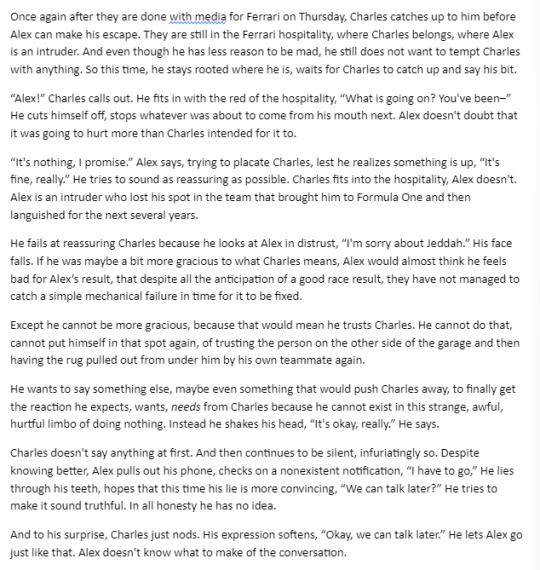
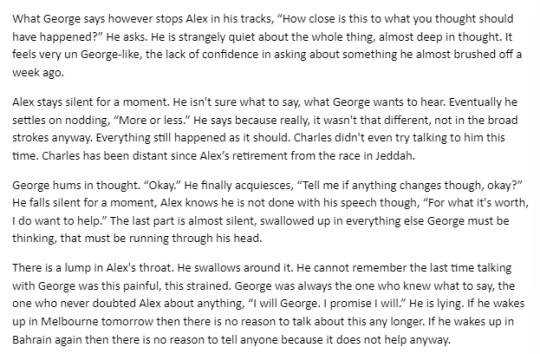

Put a pin in this for chapter 5 (Chapter 2 & 3)

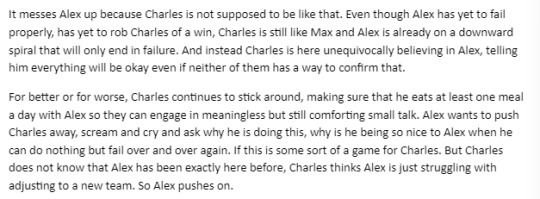


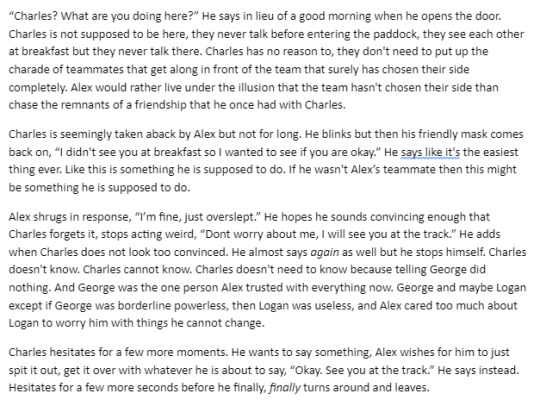

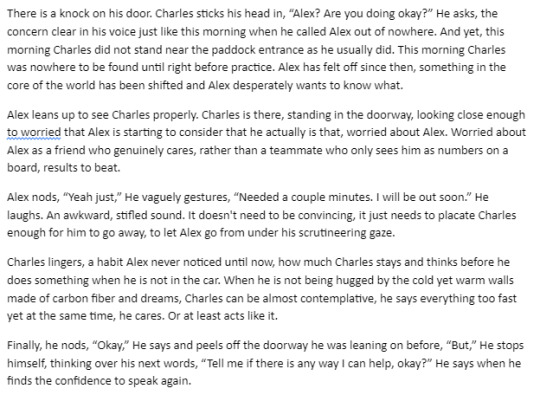

A series of ey Charles what the fuck moments. Not exhaustive (Chapter 2 & 3 & 4)

Hey Alex wanna revisit this train of thought? (Chapter 3)

The last time something was called a nightmare- (Chapter 3)

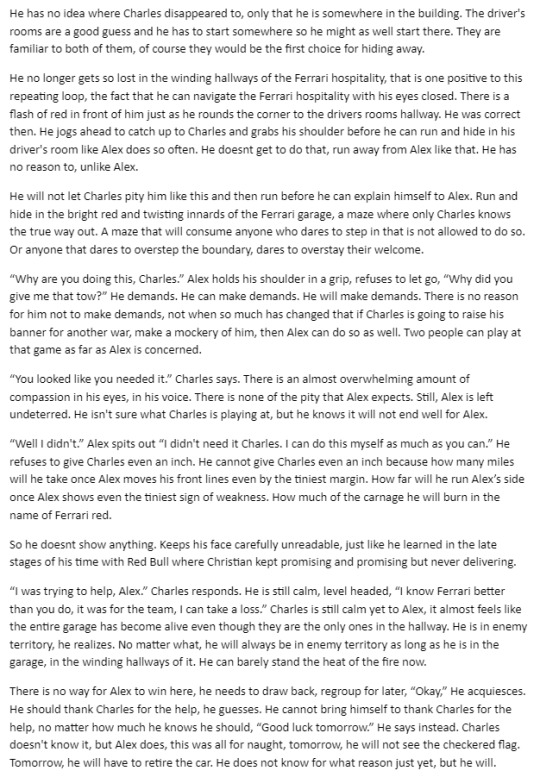
Parallels parallels (Chapter 1 & 3)

Consider in context of Chapter 4 (Chapter 3)

Interesting train of thought you've got going there (Chapter 4)

George isn't the only one capable of doing that, he isn't the only childhood friend Alex has in the paddock (Chapter 4)


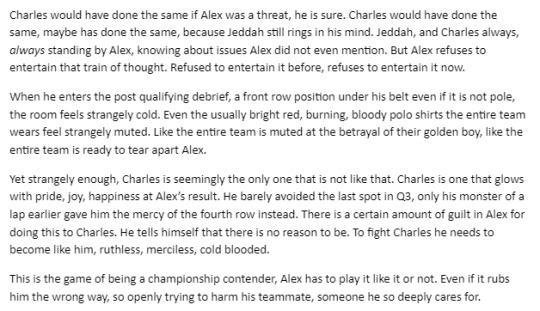
Okay but why do you think Charles is like that. Why does George have to be the outlier. And why does he have to play it? Non exhaustive (Chapter 4)
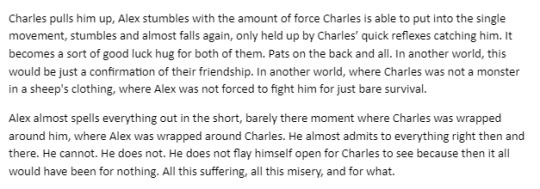
Okay this was 50% very self indulgent but also, yeah... (Chapter 4)
#ask#ask game#caitlin tag#help i ran out of image space adsf#there is definitely more especially in the george-charles foil thing in ch4 and the ey charles what the fuck category#but 30 images is 30 images
4 notes
·
View notes
Note
STUDENTS
For the OP and those in a similar situation, here's some tips.
1. Always save drafts from outline to completion to show work in progress. Make sure you write a date and time as well. Glass Onion has taught me the importance of saving your handwritten notes, even your cocktail napkin doodles!
2. Mispell a few words here and there. Unless you're trying to achieve 100% perfection (whyyyy?) or failing in class where every point matters, a mispelled word is indication of human error.
3. (Fiction) Have a heart to heart talk with the teacher about your inspirations about your story, where they originated, what authors inspire you (ahem, Mr. Gaiman). Throw in ideas of a "what if" sequel/prequel (even though you're not planning for one) and your teacher might realize that this isn't just a mere work of words only.
4. (Academic Papers) Always have your citations. Cite every dang sentence if you must. The more the better.
5. Go overboard with the word limit. This is a gamble: Your educator with their short free time will probably look at your paper, commend what a nutcase you are, and probably give you an A on effort - or - they will deduct points because you are a nutcase for using up their free short time that could have been wrapped up within the word limit.
5. Expand your vocabulary and equip yourself with a thesaurus. Use uncommon words where your prose doesn't sound AI generic. Of course as a kid, you're just flexing your writing chops, but this is how you develop your style and voice over time.
6. (Fiction) Use fragmented sentences, one sentence words, and a creative use of your uncommon punctuation marks to create a sense of rhythm in your prose. High fantasy dialogue can get away from breaking grammar rules. The elipsis, itallics, colon, semi-colon--These weapons should be sparingly used but when employed at the right place and time, its the chef's kiss. I don't see a lot of AI responses use such creative punctuation.
7. Avoid overused phrases i.e. "little did she know", "once upon a time", or "saves the day", "you won't get away with this!".
8. This isn't foolproof but using a robots.txt file can ward off AI crawlers from online content. (Websites)
__________
TEACHERS
As for teachers who are concerned with AI cheating, here's a couple strategies that may work against AI use.
1. Outline review - Students submit a handwritten outline for approval prior to a final draft.
2. Flipped Classroom Structure - (homework in the classroom, video lectures at home) might work for certain subjects and age levels.
3. Mandatory Vocabulary - force students to use a list of vocabulary words in their writing assignments.
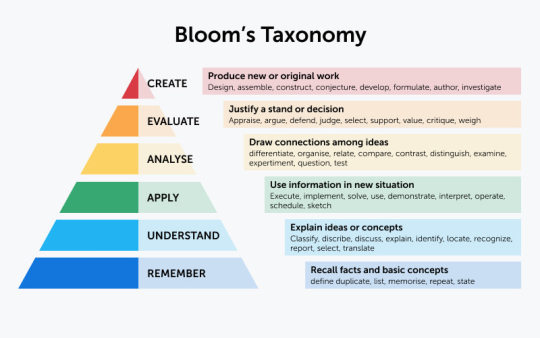
3. Bloom's Taxonomy Pyramid: Revise your writing prompts for that higher level of learning. For example, instead of just asking a student to recall their summer vacation, ask them what they would have done the same or differently? Using self-analysis and what-if? scenarios creates that out-of-the-box thinking.
4. Rubric Requirements: (for highschool and above levels) you want to create a rubric that specifically outlines specific requirements of a written assignment.
5. Get rid of written paper assignments altogether. Why should students write a paper on the American Civil War when they can role-play as Abe Lincoln?
(* yarrr i'm typing this with my thumbs, ignore the mispells.)
Hello Mr. Gaiman,
I want to first thank you for all your work and extraordinary writing!!! I am asking a quick question that I hope you can help me with, if that's okay? Years and years ago...when I was 13 or so, I wanted to write more than anything in the world. So I did. But was accused of plagiarism by a very cruel English teacher. I quit writing after that abusive event and could never bring my courage back. What I am hoping you can help me with is this; How can I put that pain behind me? And how can I help my husband's students who come to him ( he is a librarian) who are facing teachers who falsely accuse their students of AI papers or plagiarism??? I gave up a deep love of writing out of fear ... I never want to see another child discouraged in that manner again... If you can't help, I understand, truly! But I fear for children who try very hard...and take that abuse....because it is devastating. Thank you for reading this message. I await all your next stories to come!!!
I’ve not yet forgiven a teacher for marking me down in my mock O levels in 1976 because my story was “too original which meant I must have copied it from somewhere”. In about 2008 I took the central idea and wrote an award winning story out of it.
I don’t know how to help the kids being falsely accused of plagiarism or AI use. I wish teachers would put together requests for the kinds of homework and projects that have to be person-created.
1K notes
·
View notes
Text
Thank you for tagging me, @maraudersaffair and @crazybutgood! I loved reading yours. ❤ I'm going to do 10 smutty dialogue quotes instead because I'm not feeling any of my first lines and I'm curious to see what you all choose.
Rules: pick any ten fics, select some smut or pre-smut dialogue, and tag ten people. If you have written less than ten, feel free to share anyway!
These are all Drarry.
ㅤ
Keep your hands on me (E, 21k)
“They just… they want to satisfy an itch, Potter. It’s not… It’s not really the same.” Harry pressed a kiss on Malfoy’s lips. “They don’t want to wreck you like I do, you mean.” “Yes.” “Do you want to be wrecked, Draco?” “Fuck, yes,” Malfoy groaned. “By me? Or by anyone?” “By you.”
Just a trial run (E, 9k)
“You had a fantasy about paying to have sex with me?” Potter asked, frowning. Draco snorted. “No, just having sex with you in general. Potter’s eyes glazed over. “How – How old is this fantasy?” Draco took a sip of his drink. “Quite old.” “You wanted to fuck me at Hogwarts, Malfoy?” Draco’s eyes were on him, appraisingly. “Isn’t that what that was all about?”
Trouble with your tie, Potter? (E, 6.7k)
Harry’s face grew warmer, his heartbeat picking up. Malfoy reached out and put his hands on Harry’s hips, pressing against him, his front to Harry’s back. “I bet –” He kissed Harry’s neck. “I bet I could turn you around, tug your tie just slightly, and you’d fall on your knees for me.” Harry shut his eyes, not even bothering to hide the small noise that escaped him. “Yeah,” he said. It was true anyway. He tilted his head a bit, baring his neck for Malfoy, and Malfoy’s hands tightened on him. “I’d do that.”
Truth be told (E, 2.3k)
Malfoy smirked. “Really, Potter. I should have guessed you just wanted to be fucked.” He slid a hand under Harry’s shirt and a moan escaped Harry’s throat. “You do, don’t you?” “Yes,” Harry groaned. “I thought we’d already established that.” Harry was on bloody Veritaserum, had just spilled his guts in a room full of Slytherins, and it was all Hermione and her stupid inter-house parties’ fault.
At wand point (E, 2.8k)
Harry’s mind went hazy, sluggish. “Blackmailing me, Malfoy?” Malfoy smirked. “It’s not blackmailing if you offer, Potter.” He leaned in slightly, lips almost brushing Harry’s, and murmured, “You are offering, aren’t you?” Harry wanted to pull him into a kiss, wanted to drop to his knees and mouth him through his trousers right there and then. Instead, he said, “What if I am?”
Imperio (E, 3.8k)
Malfoy caught Harry’s hair and yanked it back hard, still panting against Nott’s cheek. “What is it? Tell me.” “I don’t like it when you kiss him,” Harry said obediently, because he didn’t, even though he was too turned on and blissed out to find it really upsetting. “Oh?” Malfoy said, sounding delighted, and then laughed and pulled Nott into a furious snog again, Nott’s cock brushing Harry’s parted lips. Harry swallowed at the sound of their moans. “Like this?”
Good (E, 300)
“So good,” Draco murmurs, stunned and a little breathless, lips dragging over Harry’s jaw. “Are you always this good, Potter?”
Why (E, 100)
“This is fucked up,” Draco says, and Harry bites down on his thigh. “Why?” “Fucking hell, Potter,” Draco whines. Harry adds another finger. “Yesterday, we weren’t even on speaking terms.”
Under the Invisibility Cloak (E, 100)
“Shhh.” Draco flicked his thumb. “You don’t want them to hear you, do you?”
You can, now (E, 100)
“Like that,” Ginny murmured. “Open your mouth. You’ve wanted this for so long.” Harry whimpered. He let Ginny guide his head forward, let Draco’s cock slide past his lips. “You’ve wanted him all along, haven’t you?”
Tagging @orange-peony, @magpiefngrlrl, @nv-md, @ladderofyears, @makeitp1nk, @sweet-s0rr0w, @roseharpermaxwell, @wolfpants and anyone who feels like sharing smutty goodness!
#drarry#drarry fanfic#drarry fic#drarry ff#drarry smut#harry x draco#draco x harry#hpdm#dmhp#tag game#smut dialogue#smut game#this change of rules is doubly self-serving#it was easier for me#but I also want to see which parts of your E or M rated fics you select#and then go and read them if I haven't already#whoever does this please tag me!!!#ff games#my fics#my AO3 fics
88 notes
·
View notes
Photo

The Secret Report is a webcomic I am doing. Could you please review it? Please note that the art is a little bit roughin the beginning.
Here's the link: https://secretreport.the-comic.org/comics/#comicimage
Keep in mind that despite the strip format, the comic is serialized (not gag a day) and the strip format was chosen purely to save on time (that's also why in the beginning it is partially in grayscale)
So, first thing jumps out immediately

Which is that I literally can not read your comic because the “Support Me Financially” subscribestar link is on top of it. It looks like your header bar is set to position:fixed so it jumps down when I try to scroll to read the comic itself. I get the desire to make the link prominent but this crosses into obnoxious (It’s also very generic, but I’m not a marketer so I won’t comment on that further), and breaks the reading experience because I have to scroll up slightly every page load. Ignoring the site design and getting int-

Actually I’m not the biggest fan of these nav icons either. You sort of have to be used to Standard Webcomic Site Template to know what they do, or even that they’re buttons at all. That’s more nitpicky, though.
So, I spent like an hour and a half going through the strips one by one and making notes in the way I often do, but after way too long I realized it was useless, because
Strip 2

Strip 31

Strip 102

There’s a remarkably rabid improvement in the presentation, here. Not just the art, but the paneling and world balloons have shot up in quality. Like, the art is still fairly crude and I’m not going to pretend otherwise, but you’re getting way more out of it now that you were originally. For a comic that’s only been going a year and change there’s a pretty significant improvement!
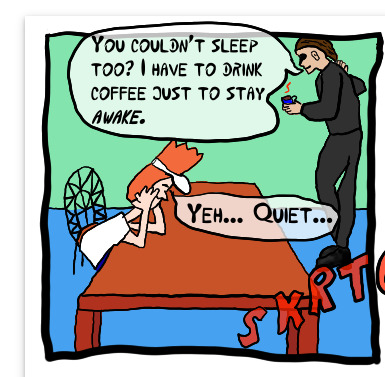
I wrote 225 words nitpicking this one panel, but really who cares. Your early comics aren’t indicative of your current work, to the point that “This dialogue from strip 7 makes no sense” isn’t actually useful feedback anymore. And that’s legitimately amazing for how short a time you’ve been working on this.
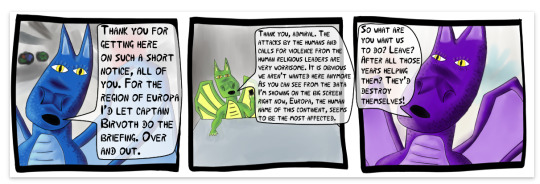
I do think, though, that you’re still having some issues with the word balloons, and I think you should focus on that because it’s probably the highest ratio of “effort spent” vs “output improved” you can get right now. Panel 2 has fifty-six words in a single balloon. The rule of thumb is 25 words max in a single balloon, and 35 words in a single panel. I’d recommend that you, and anyone writing comics, get in the habit of counting your words, and either draw more panels to fit them all in an aesthetically pleasing way, or try to cut your dialogue down. (”Thank you Admiral. The calls for violence from the human religious leaders make it clear we’re not wanted here anymore” is 20 words and contains most of the key information)
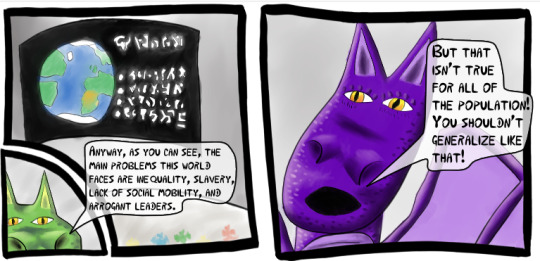
I would also recommend giving a bit more flow to the logical flow of the conversation. Here, Birvoth says the problems of this world are “Inequality, Slavery, Lack of Social Mobility, and Arrogant Leaders” and Soria tells him not to generalize all humans. But....he didn’t. All four of humans problems he lists are social problems about how some groups of humans oppress others, not “humans are greedy”, so Soria’s objection doesn’t make any sense.

He did generalize them in the previous strip, but then he walked it back to talk about social problems and Soria has this kind of delayed response

Shuffling the panels like this makes the conversation flow smoother, making Soria’s objection better time while having the interesting side effect that now Birvoth appears to be walking it back in response to her. Which you may or may not consider a positive, but that’s the kind of thing I’d encourage you to think about. (Strips 88 and 89 have a similar delayed response thing happening, where the woman says “you can’t help” and then Lemmy stands around for two panels before starting the next strip with “No I’m pretty sure I can help”).
This might be presumptuous, but I get the sense this kind of thing and the word balloon issues that you don’t write out your dialogue before drawing the strip. I think it might be a helpful exercise to try writing a movie-style “script” for your comic, and then putting it down for a bit, then coming back to give it a once-over with fresh eyes and try to edit it down. I think that might help you catch this kind of stuff and find your own solutions to it.
I look forward to seeing what your comic looks like next year. You’re improving at a pretty good pace!
38 notes
·
View notes
Text
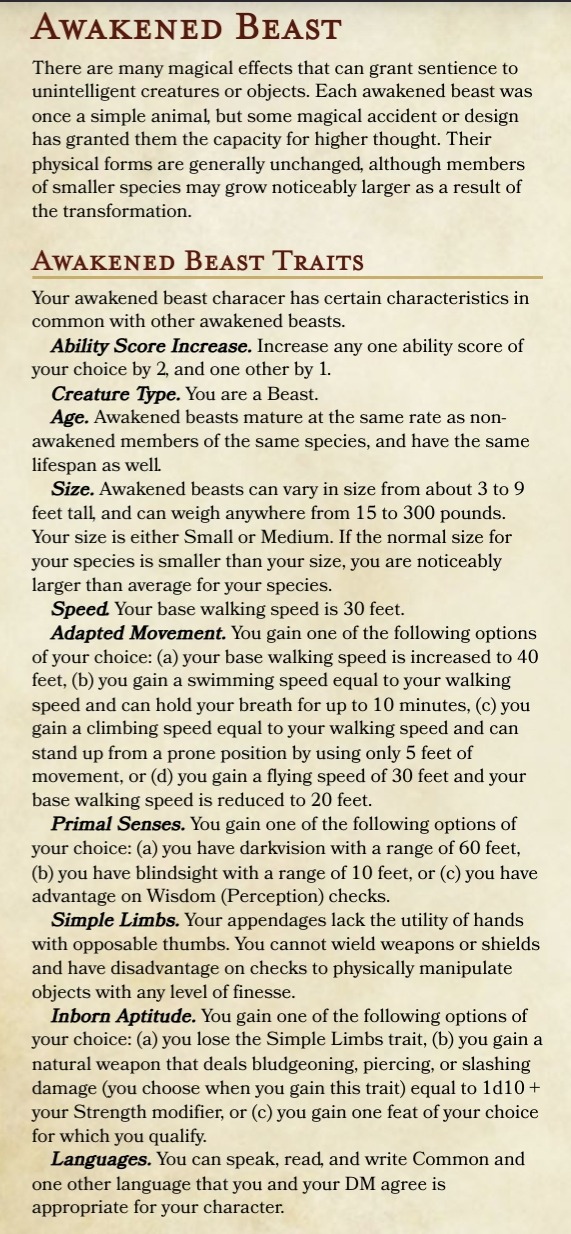
Awakened Beast
There are many magical effects that can grant sentience to unintelligent creatures or objects. Each awakened beast was once a simple animal, but some magical accident or design has granted them the capacity for higher thought. Their physical forms are generally unchanged, although members of smaller species may grow noticeably larger as a result of the transformation.
Awakened Beast Traits
Your awakened beast characer has certain characteristics in common with other awakened beasts.
Ability Score Increase. Increase any one ability score of your choice by 2, and one other by 1.
Creature Type. You are a Beast.
Age. Awakened beasts mature at the same rate as non-awakened members of the same species, and have the same lifespan as well.
Size. Awakened beasts can vary in size from about 3 to 9 feet tall, and can weigh anywhere from 15 to 300 pounds. Your size is either Small or Medium. If the normal size for your species is smaller than your size, you are noticeably larger than average for your species.
Speed. Your base walking speed is 30 feet.
Adapted Movement. You gain one of the following options of your choice: (a) your base walking speed is increased to 40 feet, (b) you gain a swimming speed equal to your walking speed and can hold your breath for up to 10 minutes, (c) you gain a climbing speed equal to your walking speed and can stand up from a prone position by using only 5 feet of movement, or (d) you gain a flying speed of 30 feet and your base walking speed is reduced to 20 feet.
Primal Senses. You gain one of the following options of your choice: (a) you have darkvision with a range of 60 feet, (b) you have blindsight with a range of 10 feet, or (c) you have advantage on Wisdom (Perception) checks.
Simple Limbs. Your appendages lack the utility of hands with opposable thumbs. You cannot wield weapons or shields and have disadvantage on checks to physically manipulate objects with any level of finesse.
Inborn Aptitude. You gain one of the following options of your choice: (a) you lose the Simple Limbs trait, (b) you gain a natural weapon that deals bludgeoning, piercing, or slashing damage (you choose when you gain this trait) equal to 1d10 + your Strength modifier, or (c) you gain one feat of your choice for which you qualify.
Languages. You can speak, read, and write Common and one other language that you and your DM agree is appropriate for your character.
---------------------------------------------
This is a 5e homebrew I'm really excited about. I think it provides a decent template from which a player could build a character for most land-dwelling animals. Just pick the options that best match the species you're playing!
I think the Simple Limbs trait is vital for awakened beast PCs (of most species) to feel believable in most D&D settings, but it also goes against the fundamental assumptions of the game, so it's going to lead to situations where the DM has to rule on things that this homebrew doesn't cover. Should the natural weapon from Inborn Aptitude count as a monk weapon? Should it count as a two-handed weapon for the Great Weapon Fighting style? What if your wolf ranger wants to use the Two-Weapon Fighting style? What kinds of magic items can you use without hands? How much does plate mail for a black bear cost?
With the understanding that any character built using this template will require an ongoing dialogue with the DM to work out issues as they arise, I think this forms a good starting point for playing beasts in 5th edition.
So go forth my bar-bear-ians, raccoon rogues, and wild magic pigeons! Unleash the beast!
102 notes
·
View notes
Note
What are your Thots on jake’s pq route?
I already wrote some about it in this post where I discuss the problem with taking dirkjake as a literal parallel to tavris (Mainly, that it’s inaccurate to both situations and misrepresents the dynamics at play) but it’s been long enough since release that I feel like I can talk about it without that criticism being taken as a personal witch hunt. TL;DR: As a general rule of thumb I don’t cite Jake’s PQ as part of his characterization, and I think basing your Jakewriting on it will only lead you astray.
I liked a lot of the Pesterquest routes and the alphas were among some of my favorites, but I think when you play the four of them in sequence Jake’s really... stands as the odd one out. It’s almost as if he’s afforded way less sympathy from the get go for some indiscernible reason, or like MSPAR took a day to say ‘I can’t stand this kid in particular’ after dealing with waaaaaaaay more mindboggling troll customs or stupid dangerous situations that tested their patience and their limits. When it comes down to it, it’s mostly an issue of framing.
Let’s go with the “Just the Alpha routes” example, because I think that makes the overall context clearer and the response/reactions it gathered (or the lack thereof) easier to understand. The alpha kids were the last 4 Pesterquest episodes. They were also afforded entire volumes just for themselves, which cemented our expectations on “oh, they’re going to really dig into unexplored territory!” and for the most part, that’s what we got! It was really nice to see the internal mechanics of Jane as someone raised within a corporate echochamber, Roxy as a grieving, isolated kid, deprived of all human contact, and Dirk as a nerdy doomsday prepper haunted by private flashes of himself as a supervillain. It all works! Those are things the alpha kids were dealing with on the background of the broader Homestuck story, things we were only hinted at as the *larger* problems played out. It makes you understand their point of view. Except on Jake's route, where nothing about his life seems to be relevant at all?
With Jane we get discussions about HIC and her family, with Roxy beautiful passages about a mother they never met and growing up alone— Same for Dirk, who gets a whole brother zapped from an alternate timeline. But on Jake's route there's not even an expansive dialogue path dedicated to Grandma English, Skaianet, the rebellion, or the giant red ship that came and murdered her in the night and then bombed his house, leaving him trapped inside his only surviving tower. No understanding passage realizing that this kid has had to fend for himself in an island full of Actual Giant Alien Monsters trying to eat him alive, or that he cremated his guardian specifically to avoid attracting predators to the scent of fresh blood drying on her mutilated corpse at the age of an actual toddler. The text refuses to dig into any of the psychological implications or impact an environment like this could have on a kid, which is even weirder when you consider MSPAR has met and helped Vriska get out of a similar situation. The whole thing with Jane in the previous volume has just happened, even, while Jake's particularities go unremarked. He was just supposed to deal with it. And that's because a choice was made to portray all of Jake's problems in this route as sort of... single handedly Dirk's fault? Something he should have Just Dealt with?
There's not even a hint that Jake knows Hal exists. Which is important! Jake can pick out Hal from Dirk based on *verbal cues*, and the fact that he considers Hal a barrier between him and his "real friend" getting to communicate with one another is a whole point of contention (and even comedy) in the story proper. Instead of examining Jake's isolation, or grief, or how he literally locks himself in his room and plasters it with cinematic posters to pretend he's just the main lead of a wacky adventure movie in the face of the immense shitshow outside, we get brobot acting nonsensically and threatening to break into Jake's room to beat him up.
A general reminder on brobot: He was programmed to scout the jungle and deal with predators so Jake could a) Be allowed to safely leave his room (something he simply didn't do before age 13 out of sheer terror, and we know this because dirk and jake talk about it on his birthday conversation, when he first gets brobot) and
b) Learn how to defend himself in the case of a surprise attack, with different combat settings adjusted to his level. The brobot has a novice mode Jake feels patronized by, but pushes him up levels quickly enough. In Homestuck proper, the brobot only enters "stalking mode" after Hal gets pissy with Jake for finding him out, and forcefully switches the setting on to make Jake work for the Uranium inside it. When you take Hal out of the picture, this plotline makes no sense! Jake's route is set way before the Alphas even think of entering the game, so this particular event hasn't even happened. Jake goes on to text Roxy and she turns the stalking setting off remotely anyways, so even if brobot was programmed to murder Jake in his sleep, or jump him inside the safe zone of his room (he's not) he has literally no reason to be acting like that when he's been set to Baby Buff Up Mode.
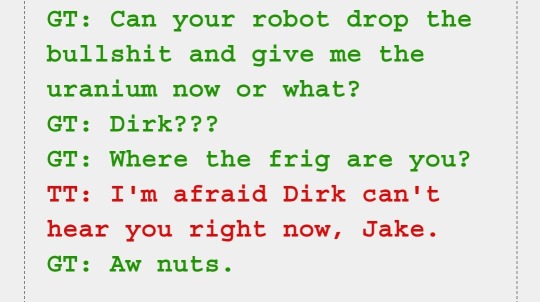
(Brobot does end up spontaneously pulling himself apart to give Jake his reward after this)
Which brings me to my other problem with the general framing of this volume; the alpha kids don't feel present in Jake's life as friends at all. It's all "romantic options" and "shipping discourse" and MSPAR making these silly logic jumps to justify insisting on this line of query, and all it does is completely flatten out anything of interest having to do with Jake as a Person, to build up an image of Dirk as being suspicious and shady for his volume and more or less come to the conclusion that Jake sucks because he just Cant Choose Who To Date Between All His Friends! And that's why jake is just like tavros… and dirk is just like vriska! Or something.
And just as a reminder, here's Jake talking with Roxy so I don't have to explain why that feels like a weird choice to me. (click to zoom)
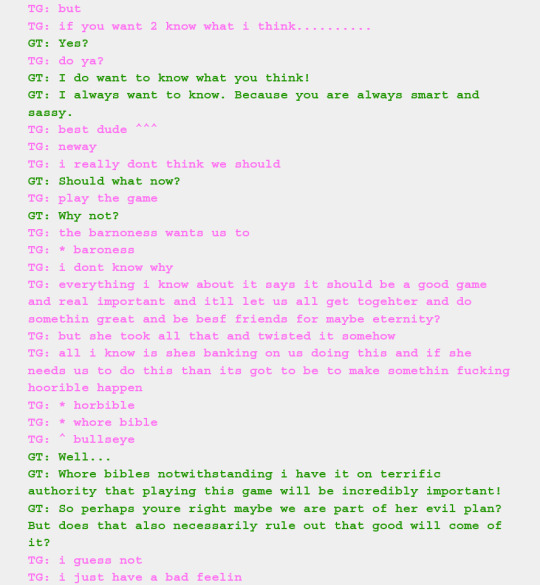
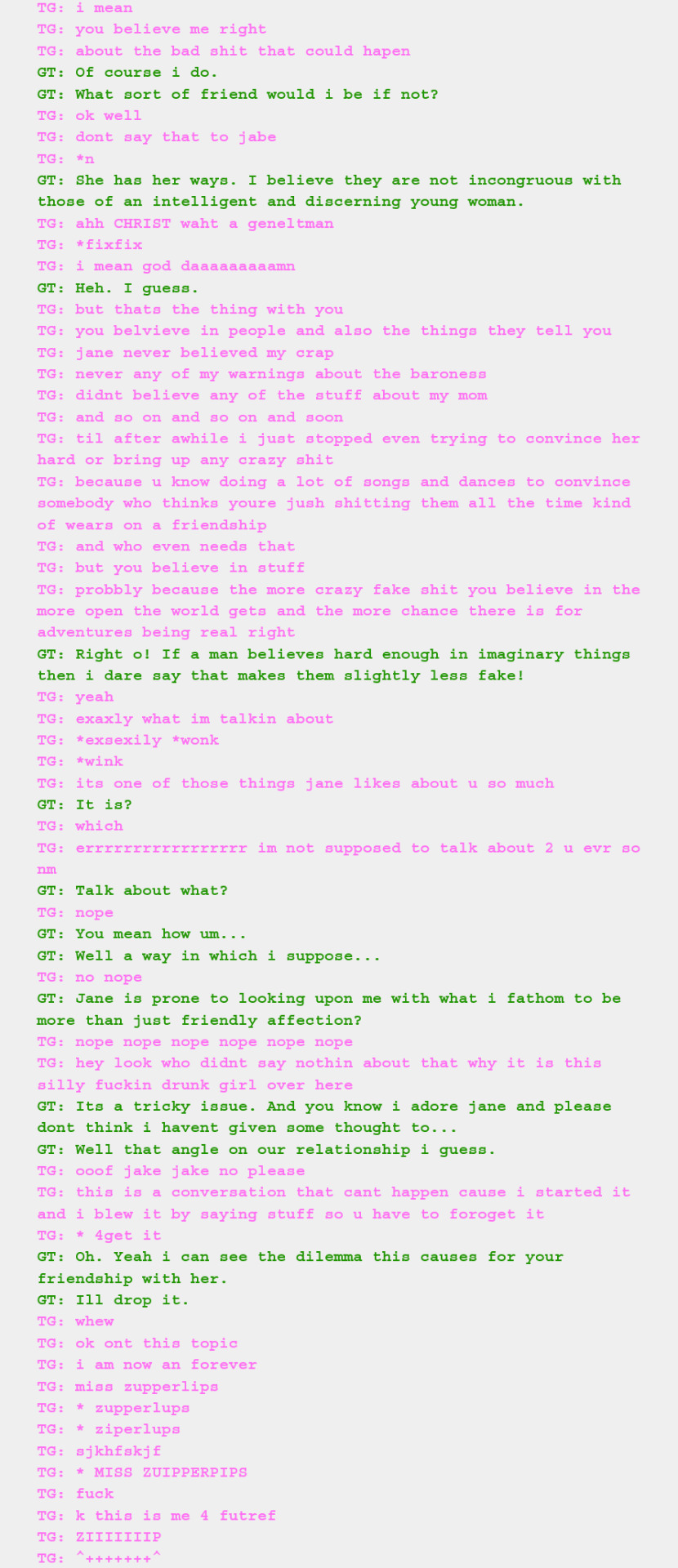
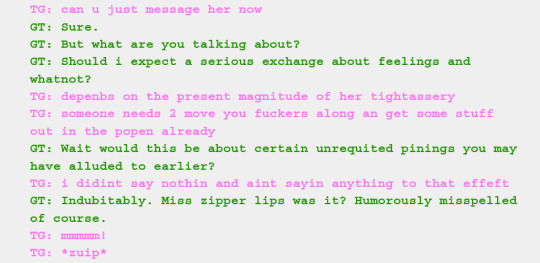
And then there's the endings. On the vriska ending, MSPAR just ends up weirdly angry at jake for being such a piss baby and not getting that he's tavros and dirk is vriska so he had to… uh… take all his anger out on this 13 year old alien girl he has never met and teach her a lesson to prepare to do the same on dirk, or something. And on the other ending Jake mentions his pen pal, is zapped to meet jade, they have some non-committal greetings and then a cosplay party where Jake insists that he totally likes Lara croft not because she's a femme fatale and he relates to that, because he's never ever in his life thought of anyone being interested on him. Or Something. He likes Lara croft for normal reasons only. He wears really tiny shorts and does sexy poses because he's not aware at all of how other people find him attractive. He's just too dumb to get this, or the shipping thing, or that he's tavros and Dirk is vriska (who the hell are these people?).
Jake feels like an afterthought in the grand scope of events. Sidelined on his own episode. This volume is busy with rehashing age old fandom arguments that have little to do with his character, because said arguments were started and maintained by bored teens engrossed on fighting online instead of analyzing Homestuck; we introduce vriska for no interesting reason at all (thank god at least Jake has enough decency to say he's not into hitting on 13-year-olds, because that would have been particularly rancid.) And aside from catchphrases and old slang sprinkled liberally into his dialogue like a fog making machine, none of the motivation for the character is there. What does he want? What does he fear? Why does he act like the way he does? What would accommodating him look like? What would helping him look like? We get this on Jane's volume, Roxy's volume, and Dirk's volume. To really heart-wrenching and dramatic results, too. You get to know who they are, where they live, what they want, what they fear, what might help them get better, but Jake is just sort of There. He's a burden. MSPAR either ends this volume berating him for not doing what they want or finding him weird and confusing and like they don't know each other at all, and the fact both of those were marked as dubiously bad ends in the game files speaks for itself, I think.
375 notes
·
View notes